2015
Prayer to St. Christopher for Safe #Travels and #Motorists - SHARE
Saint Christopher's Protection Prayer
Dear Saint Christopher, protect me today in all my travels along the road's way. Give your warning sign if danger is near so that I may stop while the path is clear. Be at my window and direct me through when the vision blurs From out of the blue. Carry me safely to my destined place, like you carried Christ in your close embrace. Amen.
FOR BREAKING NEWS, INSPIRATIONAL STORIES AND FREE MOVIES
LIKE http://facebook.com/catholicnewsworld
St. Christopher's Prayer
O Glorious St. Christopher you have inherited a beautiful name, Christbearer, as a result of the wonderful legend that while carrying people across a raging stream you also carried the Child Jesus. Teach us to be true Christbearers to those who do not know Him. Protect all of us that travel both near and far and petition Jesus to be with us always. Amen. Join us on
2015
Novena to St. James the Greater - Patron of Arthritis, Veterinarians - Compostela #Pilgrims - SHARE
Every Day of Novena 1 Our Father, 1 Hail Mary and 1 Glory Be

First Day

Second Day

Third Day
 Fifth Day
Fifth Day
 Sixth Day
Sixth Day
 Seventh Day
Seventh Day

Eighth Day

Ninth Day

Feast of St. James
First Day
The Call of James (Matthew 4:18-22)
As Jesus was walking by the Sea of Galilee, he saw two brothers, Simon who is called Peter, and his brother Andrew, casting a net into the sea; they were fishermen. He said to them, "Come after me, and I will make you fishers of men." At once they left their nets and followed him.
He walked along from there and saw two other brothers, James, the son of Zebedee, and his brother John. They were in a boat, with their father Zebedee, mending their nets. He called them, and immediately they left their boat and their father and followed him.
FOR BREAKING NEWS, INSPIRATIONAL STORIES AND FREE MOVIES
LIKE http://facebook.com/catholicnewsworld
Reflection
Mending their nets on the shores of the Sea of Galilee, James and John look up to see Jesus. And he calls them to do something totally new—to follow him; and to become something new as well—“fishers of men.” Why did Jesus choose fishermen for his first disciples? Perhaps because fishing takes strength, skill, persistence, and patience. Perhaps because fishermen live amidst the beauty and danger of the natural world, and understand their dependence on God. Perhaps because fishermen know when to work long, hard hours, and when to rest. An Apostle needs all these qualities as well.
When they hear the Lord’s call, James and John respond at once. They do not ask questions, finish the task at hand, or even consult with their father; instead, “immediately” they leave the old life behind and follow Jesus. For us, too, the call to discipleship usually comes in the midst of the humdrum patterns of our daily lives, when we are least expecting it. Are we ready to respond to the Lord’s call—to do something different; to become something new?
As Jesus was walking by the Sea of Galilee, he saw two brothers, Simon who is called Peter, and his brother Andrew, casting a net into the sea; they were fishermen. He said to them, "Come after me, and I will make you fishers of men." At once they left their nets and followed him.
He walked along from there and saw two other brothers, James, the son of Zebedee, and his brother John. They were in a boat, with their father Zebedee, mending their nets. He called them, and immediately they left their boat and their father and followed him.
FOR BREAKING NEWS, INSPIRATIONAL STORIES AND FREE MOVIES
LIKE http://facebook.com/catholicnewsworld
Reflection
Mending their nets on the shores of the Sea of Galilee, James and John look up to see Jesus. And he calls them to do something totally new—to follow him; and to become something new as well—“fishers of men.” Why did Jesus choose fishermen for his first disciples? Perhaps because fishing takes strength, skill, persistence, and patience. Perhaps because fishermen live amidst the beauty and danger of the natural world, and understand their dependence on God. Perhaps because fishermen know when to work long, hard hours, and when to rest. An Apostle needs all these qualities as well.
When they hear the Lord’s call, James and John respond at once. They do not ask questions, finish the task at hand, or even consult with their father; instead, “immediately” they leave the old life behind and follow Jesus. For us, too, the call to discipleship usually comes in the midst of the humdrum patterns of our daily lives, when we are least expecting it. Are we ready to respond to the Lord’s call—to do something different; to become something new?
Second Day
The Sons of Thunder (Luke 9:51-56)
When the days for his being taken up were fulfilled, Jesus resolutely determined to journey to Jerusalem, and he sent messengers ahead of him. On the way they entered a Samaritan village to prepare for his reception there, but they would not welcome him because the destination of his journey was Jerusalem. When the disciples James and John saw this they asked, "Lord, do you want us to call down fire from heaven to consume them?"
Jesus turned and rebuked them, and they journeyed to another village.
Reflection
Jesus gave Simon a special name – “Peter.” Jesus also gives James and John a special name, “Boanerges,” which means “sons of thunder” (Mark 3:17). Scripture scholars tell us that the giving of a new name is a sign of an inner transformation: think of Abram, who became Abraham, and Jacob, who became Israel. James and John must have been full of zeal for the Kingdom to receive a name like “sons of thunder.”
We get a glimpse of that zeal for the Lord’s work in this passage from Luke. When the people of one town refuse to welcome Jesus, James and John offer to “call down fire from heaven,” to destroy them as Sodom and Gomorrah were destroyed when they refused to receive the Lord. But Jesus “rebukes” them. That is not the way of the Kingdom. Jesus invites, but he does not command, and his disciples are to do the same.
How do we respond to rejection? With the “thunder” of James, or with the peace of Christ?
When the days for his being taken up were fulfilled, Jesus resolutely determined to journey to Jerusalem, and he sent messengers ahead of him. On the way they entered a Samaritan village to prepare for his reception there, but they would not welcome him because the destination of his journey was Jerusalem. When the disciples James and John saw this they asked, "Lord, do you want us to call down fire from heaven to consume them?"
Jesus turned and rebuked them, and they journeyed to another village.
Reflection
Jesus gave Simon a special name – “Peter.” Jesus also gives James and John a special name, “Boanerges,” which means “sons of thunder” (Mark 3:17). Scripture scholars tell us that the giving of a new name is a sign of an inner transformation: think of Abram, who became Abraham, and Jacob, who became Israel. James and John must have been full of zeal for the Kingdom to receive a name like “sons of thunder.”
We get a glimpse of that zeal for the Lord’s work in this passage from Luke. When the people of one town refuse to welcome Jesus, James and John offer to “call down fire from heaven,” to destroy them as Sodom and Gomorrah were destroyed when they refused to receive the Lord. But Jesus “rebukes” them. That is not the way of the Kingdom. Jesus invites, but he does not command, and his disciples are to do the same.
How do we respond to rejection? With the “thunder” of James, or with the peace of Christ?
Third Day
A Child Raised from the Dead (Luke 8:40-42, 49-56)
A man named Jairus, an official of the synagogue, came forward. He fell at the feet of Jesus and begged him to come to his house, because he had an only daughter, about twelve years old, and she was dying…. Someone from the synagogue official's house arrived and said, "Your daughter is dead; do not trouble the teacher any longer."
On hearing this, Jesus answered him, "Do not be afraid; just have faith and she will be saved."
When he arrived at the house he allowed no one to enter with him except Peter and John and James, and the child's father and mother. All were weeping and mourning for her, when he said, "Do not weep any longer, for she is not dead, but sleeping."
And they ridiculed him, because they knew that she was dead. But he took her by the hand and called to her, "Child, arise!" Her breath returned and she immediately arose. He then directed that she should be given something to eat.
Her parents were astounded, and he instructed them to tell no one what had happened.
Reflection
When Jesus raises the daughter of Jairus from the dead, he does not take all of his disciples with him. Only Peter, James, and John are in the room with the girl and her parents, when, with a word and a touch of the hand, Jesus restores her to life.
Jesus tells them all to keep silence about this great miracle. Only when Jesus himself is raised from the dead will the three Apostles understand what it is they have witnessed: the very power of God, triumphant over evil, over disease and sickness of every kind, over death itself. James, with Peter and John, is a special witness to resurrection. He will be able to speak to others the saving words of Christ: “just have faith.”
A man named Jairus, an official of the synagogue, came forward. He fell at the feet of Jesus and begged him to come to his house, because he had an only daughter, about twelve years old, and she was dying…. Someone from the synagogue official's house arrived and said, "Your daughter is dead; do not trouble the teacher any longer."
On hearing this, Jesus answered him, "Do not be afraid; just have faith and she will be saved."
When he arrived at the house he allowed no one to enter with him except Peter and John and James, and the child's father and mother. All were weeping and mourning for her, when he said, "Do not weep any longer, for she is not dead, but sleeping."
And they ridiculed him, because they knew that she was dead. But he took her by the hand and called to her, "Child, arise!" Her breath returned and she immediately arose. He then directed that she should be given something to eat.
Her parents were astounded, and he instructed them to tell no one what had happened.
Reflection
When Jesus raises the daughter of Jairus from the dead, he does not take all of his disciples with him. Only Peter, James, and John are in the room with the girl and her parents, when, with a word and a touch of the hand, Jesus restores her to life.
Jesus tells them all to keep silence about this great miracle. Only when Jesus himself is raised from the dead will the three Apostles understand what it is they have witnessed: the very power of God, triumphant over evil, over disease and sickness of every kind, over death itself. James, with Peter and John, is a special witness to resurrection. He will be able to speak to others the saving words of Christ: “just have faith.”
James, Witness to the Glory of Christ (Matthew 17:1-9)
Jesus took Peter, James, and John his brother, and led them up a high mountain by themselves. And he was transfigured before them; his face shone like the sun and his clothes became white as light. And behold, Moses and Elijah appeared to them, conversing with him.
Then Peter said to Jesus in reply, "Lord, it is good that we are here. If you wish, I will make three tents here, one for you, one for Moses, and one for Elijah." While he was still speaking, behold, a bright cloud cast a shadow over them, then from the cloud came a voice that said, "This is my beloved Son, with whom I am well pleased; listen to him."
When the disciples heard this, they fell prostrate and were very much afraid. But Jesus came and touched them, saying, "Rise, and do not be afraid." And when the disciples raised their eyes, they saw no one else but Jesus alone. As they were coming down from the mountain, Jesus charged them, "Do not tell the vision to anyone until the Son of Man has been raised from the dead."
Reflection
In the Gospel according to Matthew, the Transfiguration of Jesus comes immediately following his first prediction of his Passion. This is a hard teaching indeed: how can the Messiah, the Chosen One of God, the Savior, be crucified? Peter speaks for all of them when he says, “God forbid, Lord! No such thing shall ever happen to you” (Matthew 16:22). Jesus reply is harsh: “get behind me, Satan! You are thinking not as God does, but as human beings do.” The disciples begin to understand that to follow Jesus is to carry the cross.
But there is more. Jesus allows Peter, James, and John a blinding glimpse of his heavenly glory. They see him shining brighter than the sun, speaking with Moses and Elijah; and they hear God’s voice, urging them to listen to what he says. In glimpsing the Transfiguration of Jesus, Peter, James and John are glimpsing the Resurrection. Jesus shows them this glimpse to help them understand that for all who follow Jesus, suffering and glory go hand in hand.
Jesus took Peter, James, and John his brother, and led them up a high mountain by themselves. And he was transfigured before them; his face shone like the sun and his clothes became white as light. And behold, Moses and Elijah appeared to them, conversing with him.
Then Peter said to Jesus in reply, "Lord, it is good that we are here. If you wish, I will make three tents here, one for you, one for Moses, and one for Elijah." While he was still speaking, behold, a bright cloud cast a shadow over them, then from the cloud came a voice that said, "This is my beloved Son, with whom I am well pleased; listen to him."
When the disciples heard this, they fell prostrate and were very much afraid. But Jesus came and touched them, saying, "Rise, and do not be afraid." And when the disciples raised their eyes, they saw no one else but Jesus alone. As they were coming down from the mountain, Jesus charged them, "Do not tell the vision to anyone until the Son of Man has been raised from the dead."
Reflection
In the Gospel according to Matthew, the Transfiguration of Jesus comes immediately following his first prediction of his Passion. This is a hard teaching indeed: how can the Messiah, the Chosen One of God, the Savior, be crucified? Peter speaks for all of them when he says, “God forbid, Lord! No such thing shall ever happen to you” (Matthew 16:22). Jesus reply is harsh: “get behind me, Satan! You are thinking not as God does, but as human beings do.” The disciples begin to understand that to follow Jesus is to carry the cross.
But there is more. Jesus allows Peter, James, and John a blinding glimpse of his heavenly glory. They see him shining brighter than the sun, speaking with Moses and Elijah; and they hear God’s voice, urging them to listen to what he says. In glimpsing the Transfiguration of Jesus, Peter, James and John are glimpsing the Resurrection. Jesus shows them this glimpse to help them understand that for all who follow Jesus, suffering and glory go hand in hand.
With the Lord in the Garden of Gethsemane (Mark 14:32-42)
They came to a place named Gethsemane, and Jesus said to his disciples, "Sit here while I pray." He took with him Peter, James, and John, and began to be troubled and distressed. Then he said to them, "My soul is sorrowful even to death. Remain here and keep watch."
He advanced a little and fell to the ground and prayed that if it were possible the hour might pass by him; he said, "Abba, Father, all things are possible to you. Take this cup away from me, but not what I will but what you will."
When he returned he found them asleep. He said to Peter, "Simon, are you asleep? Could you not keep watch for one hour? Watch and pray that you may not undergo the test. The spirit is willing but the flesh is weak."
Withdrawing again, he prayed, saying the same thing. Then he returned once more and found them asleep, for they could not keep their eyes open and did not know what to answer him.
He returned a third time and said to them, "Are you still sleeping and taking your rest? It is enough. The hour has come. Behold, the Son of Man is to be handed over to sinners. Get up, let us go. See, my betrayer is at hand."
Reflection
The same three who witnessed Christ in glory – Peter, James, and John – witness his sufferings in the Garden of Gethsemane. As scripture commentator Marie Noonan Sabin observes, the contrasts between the two scenes are poignant. There, Jesus shone with dazzling light; here, all is darkness. There, Jesus stood above the mountain; here, he falls to the ground. There, the Father spoke words of love; here, Jesus asks his Father to take the cup of suffering away from him.
In this last hour, Jesus does not want to be alone: he wants his friends at his side. But these friends, who will scatter when Jesus is arrested, have already begun to abandon him: they cannot even stay awake to keep him company.
Peter, James, and John will become pillars of the Church, preaching the Good News far and wide. Jesus wants these Apostles to be witnesses, not just of the divine signs and wonders he performs, but of his humanity and his suffering. He wants them to be aware of his weakness—and their own. Perhaps that is why the sacrament of penance is such an important part of our faith. In becoming more aware of our own weakness, we become more compassionate and understanding towards others.
They came to a place named Gethsemane, and Jesus said to his disciples, "Sit here while I pray." He took with him Peter, James, and John, and began to be troubled and distressed. Then he said to them, "My soul is sorrowful even to death. Remain here and keep watch."
He advanced a little and fell to the ground and prayed that if it were possible the hour might pass by him; he said, "Abba, Father, all things are possible to you. Take this cup away from me, but not what I will but what you will."
When he returned he found them asleep. He said to Peter, "Simon, are you asleep? Could you not keep watch for one hour? Watch and pray that you may not undergo the test. The spirit is willing but the flesh is weak."
Withdrawing again, he prayed, saying the same thing. Then he returned once more and found them asleep, for they could not keep their eyes open and did not know what to answer him.
He returned a third time and said to them, "Are you still sleeping and taking your rest? It is enough. The hour has come. Behold, the Son of Man is to be handed over to sinners. Get up, let us go. See, my betrayer is at hand."
Reflection
The same three who witnessed Christ in glory – Peter, James, and John – witness his sufferings in the Garden of Gethsemane. As scripture commentator Marie Noonan Sabin observes, the contrasts between the two scenes are poignant. There, Jesus shone with dazzling light; here, all is darkness. There, Jesus stood above the mountain; here, he falls to the ground. There, the Father spoke words of love; here, Jesus asks his Father to take the cup of suffering away from him.
In this last hour, Jesus does not want to be alone: he wants his friends at his side. But these friends, who will scatter when Jesus is arrested, have already begun to abandon him: they cannot even stay awake to keep him company.
Peter, James, and John will become pillars of the Church, preaching the Good News far and wide. Jesus wants these Apostles to be witnesses, not just of the divine signs and wonders he performs, but of his humanity and his suffering. He wants them to be aware of his weakness—and their own. Perhaps that is why the sacrament of penance is such an important part of our faith. In becoming more aware of our own weakness, we become more compassionate and understanding towards others.
James, one of the Twelve (Matthew 10:1-10)
Jesus summoned his twelve disciples and gave them authority over unclean spirits to drive them out and to cure every disease and every illness. The names of the twelve apostles are these: first, Simon called Peter, and his brother Andrew; James, the son of Zebedee, and his brother John; Philip and Bartholomew, Thomas and Matthew the tax collector; James, the son of Alphaeus, and Thaddeus; Simon the Cananean, and Judas Iscariot who betrayed him.
Jesus sent out these twelve after instructing them thus, "Do not go into pagan territory or enter a Samaritan town. Go rather to the lost sheep of the house of Israel. As you go, make this proclamation: 'The kingdom of heaven is at hand.' Cure the sick, raise the dead, cleanse lepers, drive out demons. Without cost you have received; without cost you are to give. Do not take gold or silver or copper for your belts; no sack for the journey, or a second tunic, or sandals, or walking stick. The laborer deserves his keep.”
Reflection
Jesus gives the Apostles a mission. They are to drive out demons, cure the sick, and proclaim the Kingdom of God: in other words, their mission is Christ’s mission.
The Apostles have an incredible gift to give: freedom, healing, life. But they are to give this gift as freely as they have received it. They are to travel not like rich people, with horses, chariots, and retinues, but like homeless wanderers: alone, unarmed, without so much as a change of clothes. They are given great “authority,” but they must also become totally vulnerable, accepting the hospitality and generosity of others. They are to be, in short, like Jesus, who “emptied himself, taking the form of a slave, and coming in human likeness.” (Philippians 2) The Church is called to do the same.
Jesus summoned his twelve disciples and gave them authority over unclean spirits to drive them out and to cure every disease and every illness. The names of the twelve apostles are these: first, Simon called Peter, and his brother Andrew; James, the son of Zebedee, and his brother John; Philip and Bartholomew, Thomas and Matthew the tax collector; James, the son of Alphaeus, and Thaddeus; Simon the Cananean, and Judas Iscariot who betrayed him.
Jesus sent out these twelve after instructing them thus, "Do not go into pagan territory or enter a Samaritan town. Go rather to the lost sheep of the house of Israel. As you go, make this proclamation: 'The kingdom of heaven is at hand.' Cure the sick, raise the dead, cleanse lepers, drive out demons. Without cost you have received; without cost you are to give. Do not take gold or silver or copper for your belts; no sack for the journey, or a second tunic, or sandals, or walking stick. The laborer deserves his keep.”
Reflection
Jesus gives the Apostles a mission. They are to drive out demons, cure the sick, and proclaim the Kingdom of God: in other words, their mission is Christ’s mission.
The Apostles have an incredible gift to give: freedom, healing, life. But they are to give this gift as freely as they have received it. They are to travel not like rich people, with horses, chariots, and retinues, but like homeless wanderers: alone, unarmed, without so much as a change of clothes. They are given great “authority,” but they must also become totally vulnerable, accepting the hospitality and generosity of others. They are to be, in short, like Jesus, who “emptied himself, taking the form of a slave, and coming in human likeness.” (Philippians 2) The Church is called to do the same.
Their Mothers’ Request (Matthew 20: 20-23)
The mother of the sons of Zebedee approached Jesus with her sons and did him homage, wishing to ask him for something. He said to her, "What do you wish?"
She answered him, "Command that these two sons of mine sit, one at your right and the other at your left, in your kingdom."
Jesus said in reply, "You do not know what you are asking. Can you drink the cup that I am going to drink?"
They said to him, "We can."
He replied, "My cup you will indeed drink, but to sit at my right and at my left, this is not mine to give but is for those for whom it has been prepared by my Father."
Reflection
In the Gospel according to Mark, James and John come to Jesus and ask for seats at his right and left—seats of honor and power—in the Kingdom. In Matthew’s Gospel, it is their mother who makes the request. It is ironic, to say the least, that this request comes immediately after Jesus tells his disciples, for the third time, what awaits him: crucifixion and death; and after a whole series of parables with the theme “the last will be first, and the first will be last” (Matthew 20:16)! Jesus responds honestly but gently to the ambition of the two brothers. They will indeed drink his cup – James was the first of the Apostles to suffer martyrdom – but only the Father knows who will sit at his right and left in the Kingdom of heaven. The only thing Jesus promises the brothers is suffering.
The mother of the sons of Zebedee approached Jesus with her sons and did him homage, wishing to ask him for something. He said to her, "What do you wish?"
She answered him, "Command that these two sons of mine sit, one at your right and the other at your left, in your kingdom."
Jesus said in reply, "You do not know what you are asking. Can you drink the cup that I am going to drink?"
They said to him, "We can."
He replied, "My cup you will indeed drink, but to sit at my right and at my left, this is not mine to give but is for those for whom it has been prepared by my Father."
Reflection
In the Gospel according to Mark, James and John come to Jesus and ask for seats at his right and left—seats of honor and power—in the Kingdom. In Matthew’s Gospel, it is their mother who makes the request. It is ironic, to say the least, that this request comes immediately after Jesus tells his disciples, for the third time, what awaits him: crucifixion and death; and after a whole series of parables with the theme “the last will be first, and the first will be last” (Matthew 20:16)! Jesus responds honestly but gently to the ambition of the two brothers. They will indeed drink his cup – James was the first of the Apostles to suffer martyrdom – but only the Father knows who will sit at his right and left in the Kingdom of heaven. The only thing Jesus promises the brothers is suffering.
Eighth Day
Response of the Other Apostles (Matthew 20: 24-28)
When the ten heard this, they became indignant at the two brothers. But Jesus summoned them and said, "You know that the rulers of the Gentiles lord it over them, and the great ones make their authority over them felt. But it shall not be so among you. Rather, whoever wishes to be great among you shall be your servant; whoever wishes to be first among you shall be your slave. Just so, the Son of Man did not come to be served but to serve and to give his life as a ransom for many."
Reflection
The disciples have listened as Jesus teaches them in parables – parables that speak of the topsy-turvy logic of God – the first last, and the last first. In asking to sit at the right and left of Jesus in the Kingdom, James and John become a parable. Do not jockey for position, Jesus warns his followers. Do not be ambitious. Instead, if you want to be great, become a servant; if you want to be first, take the last place. Why? Because that is what Jesus did.
When the ten heard this, they became indignant at the two brothers. But Jesus summoned them and said, "You know that the rulers of the Gentiles lord it over them, and the great ones make their authority over them felt. But it shall not be so among you. Rather, whoever wishes to be great among you shall be your servant; whoever wishes to be first among you shall be your slave. Just so, the Son of Man did not come to be served but to serve and to give his life as a ransom for many."
Reflection
The disciples have listened as Jesus teaches them in parables – parables that speak of the topsy-turvy logic of God – the first last, and the last first. In asking to sit at the right and left of Jesus in the Kingdom, James and John become a parable. Do not jockey for position, Jesus warns his followers. Do not be ambitious. Instead, if you want to be great, become a servant; if you want to be first, take the last place. Why? Because that is what Jesus did.
Ninth Day
James, Witness to the Resurrection (Matthew 20: 16-20)
The eleven disciples went to Galilee, to the mountain to which Jesus had ordered them. When they saw him, they worshiped, but they doubted. Then Jesus approached and said to them, "All power in heaven and on earth has been given to me. Go, therefore, and make disciples of all nations, baptizing them in the name of the Father, and of the Son, and of the holy Spirit, teaching them to observe all that I have commanded you. And behold, I am with you always, until the end of the age."
The eleven disciples went to Galilee, to the mountain to which Jesus had ordered them. When they saw him, they worshiped, but they doubted. Then Jesus approached and said to them, "All power in heaven and on earth has been given to me. Go, therefore, and make disciples of all nations, baptizing them in the name of the Father, and of the Son, and of the holy Spirit, teaching them to observe all that I have commanded you. And behold, I am with you always, until the end of the age."
Reflection
“Apostle” means “one who is sent.” In calling James and the others to be his Apostles, Jesus is sending them forth to continue the work he himself has begun, baptizing the nations, teaching, and proclaiming the Kingdom. How did James live this call? We know that he became a leader of the Church in Jerusalem (Paul referred to him as one of the “pillars” [Galatians 2:9]). We know that he preached the Gospel – tradition tells us that he journeyed as far as Spain, the “ends of the earth.” And we know that he was the first of the Apostles to suffer death for Christ (Acts 12:2). We are not all called to be Apostles, but we can all make the pattern of James’ life our own: listening to Christ, living for Christ, and dying for Christ.
“Apostle” means “one who is sent.” In calling James and the others to be his Apostles, Jesus is sending them forth to continue the work he himself has begun, baptizing the nations, teaching, and proclaiming the Kingdom. How did James live this call? We know that he became a leader of the Church in Jerusalem (Paul referred to him as one of the “pillars” [Galatians 2:9]). We know that he preached the Gospel – tradition tells us that he journeyed as far as Spain, the “ends of the earth.” And we know that he was the first of the Apostles to suffer death for Christ (Acts 12:2). We are not all called to be Apostles, but we can all make the pattern of James’ life our own: listening to Christ, living for Christ, and dying for Christ.
Feast of St. James
Let Catholics rejoice!
Let the citizens of Heaven be glad
This day.
Let the citizens of Heaven be glad
This day.
Let the priest with beautiful songs
And with chants busy himself
This day.
And with chants busy himself
This day.
This is the praiseworthy day,
Noble with divine light,
This day.
Noble with divine light,
This day.
When James to the palace
Of the Heavens ascended
This day.
Of the Heavens ascended
This day.
Conquering Herod's sword,
He received the reward of life
This day.
He received the reward of life
This day.
Therefore without end
Let us bless the Lord
This day.
Let us bless the Lord
This day.
To the great Father in Heaven
Let us offer thankful praises
This day.
Let us offer thankful praises
This day.
Pilgrims Prayer
St. James!
We come to you in eager pilgrimage.
We come as part of a great throng of pilgrims
who through the centuries have come to this place,
where you are pilgrim and host, apostle and patron.
We come to you today
because we are on a common journey.
Place yourself, patron of pilgrims,
at the head of our pilgrimage.
Teach us, apostle and friend of the Lord,
the WAY which leads to him.
Open us, preacher of the Gospel,
to the TRUTH you learned from your Master’s lips.
Give us, witness of the faith,
the strength always to love the LIFE Christ gives.
We pray in Jesus’ name. Amen.
We come as part of a great throng of pilgrims
who through the centuries have come to this place,
where you are pilgrim and host, apostle and patron.
We come to you today
because we are on a common journey.
Place yourself, patron of pilgrims,
at the head of our pilgrimage.
Teach us, apostle and friend of the Lord,
the WAY which leads to him.
Open us, preacher of the Gospel,
to the TRUTH you learned from your Master’s lips.
Give us, witness of the faith,
the strength always to love the LIFE Christ gives.
We pray in Jesus’ name. Amen.
Reading 12 COR 4:7-15
Brothers and sisters:
We hold this treasure in earthen vessels,
that the surpassing power may be of God and not from us.
We are afflicted in every way, but not constrained;
perplexed, but not driven to despair;
persecuted, but not abandoned;
struck down, but not destroyed;
always carrying about in the body the dying of Jesus,
so that the life of Jesus may also be manifested in our body.
For we who live are constantly being given up to death
for the sake of Jesus,
so that the life of Jesus may be manifested in our mortal flesh.
So death is at work in us, but life in you.
Since, then, we have the same spirit of faith,
according to what is written, I believed, therefore I spoke,
we too believe and therefore speak,
knowing that the one who raised the Lord Jesus
will raise us also with Jesus
and place us with you in his presence.
Everything indeed is for you,
so that the grace bestowed in abundance on more and more people
may cause the thanksgiving to overflow for the glory of God.
We hold this treasure in earthen vessels,
that the surpassing power may be of God and not from us.
We are afflicted in every way, but not constrained;
perplexed, but not driven to despair;
persecuted, but not abandoned;
struck down, but not destroyed;
always carrying about in the body the dying of Jesus,
so that the life of Jesus may also be manifested in our body.
For we who live are constantly being given up to death
for the sake of Jesus,
so that the life of Jesus may be manifested in our mortal flesh.
So death is at work in us, but life in you.
Since, then, we have the same spirit of faith,
according to what is written, I believed, therefore I spoke,
we too believe and therefore speak,
knowing that the one who raised the Lord Jesus
will raise us also with Jesus
and place us with you in his presence.
Everything indeed is for you,
so that the grace bestowed in abundance on more and more people
may cause the thanksgiving to overflow for the glory of God.
Responsorial PsalmPS 126:1BC-2AB, 2CD-3, 4-5, 6
R. (5) Those who sow in tears shall reap rejoicing.
When the LORD brought back the captives of Zion,
we were like men dreaming.
Then our mouth was filled with laughter,
and our tongue with rejoicing.
R. Those who sow in tears shall reap rejoicing.
Then they said among the nations,
“The LORD has done great things for them.”
The LORD has done great things for us;
we are glad indeed.
R. Those who sow in tears shall reap rejoicing.
Restore our fortunes, O LORD,
like the torrents in the southern desert.
Those that sow in tears
shall reap rejoicing.
R. Those who sow in tears shall reap rejoicing.
Although they go forth weeping,
carrying the seed to be sown,
They shall come back rejoicing,
carrying their sheaves.
R. Those who sow in tears shall reap rejoicing.
I chose you from the world,
to go and bear fruit that will last, says the Lord.
R. Alleluia, alleluia.
When the LORD brought back the captives of Zion,
we were like men dreaming.
Then our mouth was filled with laughter,
and our tongue with rejoicing.
R. Those who sow in tears shall reap rejoicing.
Then they said among the nations,
“The LORD has done great things for them.”
The LORD has done great things for us;
we are glad indeed.
R. Those who sow in tears shall reap rejoicing.
Restore our fortunes, O LORD,
like the torrents in the southern desert.
Those that sow in tears
shall reap rejoicing.
R. Those who sow in tears shall reap rejoicing.
Although they go forth weeping,
carrying the seed to be sown,
They shall come back rejoicing,
carrying their sheaves.
R. Those who sow in tears shall reap rejoicing.
AlleluiaSEE JN 15:16
R. Alleluia, alleluia.I chose you from the world,
to go and bear fruit that will last, says the Lord.
R. Alleluia, alleluia.
GospelMT 20:20-28
The mother of the sons of Zebedee approached Jesus with her sons
and did him homage, wishing to ask him for something.
He said to her,
“What do you wish?”
She answered him,
“Command that these two sons of mine sit,
one at your right and the other at your left, in your Kingdom.”
Jesus said in reply,
“You do not know what you are asking.
Can you drink the chalice that I am going to drink?”
They said to him, “We can.”
He replied,
“My chalice you will indeed drink,
but to sit at my right and at my left, this is not mine to give
but is for those for whom it has been prepared by my Father.”
When the ten heard this,
they became indignant at the two brothers.
But Jesus summoned them and said,
“You know that the rulers of the Gentiles lord it over them,
and the great ones make their authority over them felt.
But it shall not be so among you.
Rather, whoever wishes to be great among you shall be your servant;
whoever wishes to be first among you shall be your slave.
Just so, the Son of Man did not come to be served
but to serve and to give his life as a ransom for many.”
and did him homage, wishing to ask him for something.
He said to her,
“What do you wish?”
She answered him,
“Command that these two sons of mine sit,
one at your right and the other at your left, in your Kingdom.”
Jesus said in reply,
“You do not know what you are asking.
Can you drink the chalice that I am going to drink?”
They said to him, “We can.”
He replied,
“My chalice you will indeed drink,
but to sit at my right and at my left, this is not mine to give
but is for those for whom it has been prepared by my Father.”
When the ten heard this,
they became indignant at the two brothers.
But Jesus summoned them and said,
“You know that the rulers of the Gentiles lord it over them,
and the great ones make their authority over them felt.
But it shall not be so among you.
Rather, whoever wishes to be great among you shall be your servant;
whoever wishes to be first among you shall be your slave.
Just so, the Son of Man did not come to be served
but to serve and to give his life as a ransom for many.”
Saint July 25 : St. Christopher : #Patron of #Bachelors , #Travelers and Toothache
MARTYR
Feast: July 26
Information:
|
St. Christopher, a martyr, probably of the third century. Although St. Christopher is one of the most popular saints in the East and in the West, almost nothing certain is known about his life or death. The legend says: A heathen king (in Canaan or Arabia), through the prayers of his wife to the Blessed Virgin, had a son, whom he called Offerus (Offro, Adokimus, or Reprebus) and dedicated to the gods Machmet and Apollo. Acquiring in time extraordinary size and strength, Offerus resolved to serve only the strongest and the bravest. He bound himself successively to a mighty king and to Satan, but he found both lacking in courage, the former dreading even the name of the devil, and the latter frightened by the sight of a cross at the roadside. For a time his search for a new master was in vain, but at last he found a hermit (Babylas?) who told him to offer his allegiance to Christ, instructed him in the Faith, and baptized him.
Christopher, as he was now called, would not promise to do any fasting or praying, but willingly accepted the task of carrying people, for God's sake, across a raging stream. One day he was carrying a child who continually grew heavier, so that it seemed to him as if he had the whole world on his shoulders. The child, on inquiry, made himself known as the Creator and Redeemer of the world. To prove his statement the child ordered Christopher to fix his staff in the ground. The next morning it had grown into a palm-tree bearing fruit. The miracle converted many. This excited the rage of the king (prefect) of that region (Dagnus of Samos in Lycia?). Christopher was put into prison and, after many cruel torments, beheaded.
The Greek legend may belong to the sixth century; about the middle of the ninth, we find it spread through France. Originally, St. Christopher was only a martyr, and as such is recorded in the old martyrologies. The simple form of the Greek and Latin
The existence of a martyr St. Christopher cannot be denied, as was sufficiently shown by the Jesuit Nicholas Serarius, in his treatise on litanies, "Litaneutici" (Cologne, 1609), and by Molanus in his history of sacred pictures, "De picturis et imaginibus sacris" (Louvain, 1570). In a small church dedicated to the martyr St. Christopher, the body of St. Remigius of Reims was buried, 532 (Acta SS., 1 Oct., 161). St. Gregory the Great (d. 604) speaks of a monastery of St. Christopher (Epp., x., 33). The Mozarabic Breviary and Missal, ascribed to St. Isidore of Seville (d. 636), contains a special office in his honour. In 1386 a brotherhood was founded under the patronage of St. Christopher in Tyrol and Vorarlberg, to guide travellers over the Arlberg. In 1517, a St. Christopher temperance society existed in Carinthia, Styria, in Saxony, and at Munich. Great veneration was shown to the saint in Venice, along the shores of the Danube, the Rhine, and other rivers where floods or ice-jams caused frequent damage. The oldest picture of the saint, in the monastery on the Mount Sinai dates from the time of Justinian (527-65). Coins with his image were cast at Wurzburg, in Wurtermberg, and in Bohemia. His statues were placed at the entrances of churches and dwellings, and frequently at bridges; these statues and his pictures often bore the inscription: "Whoever shall behold the image of St. Christopher shall not faint or fall on that day." The saint, who is one of the fourteen holy helpers, has been chosen as patron by Baden, by Brunswick, and by Mecklenburg, and several other cities, as well as by bookbinders, gardeners, mariners, etc. He is invoked against lightning, storms, epilepsy, pestilence, etc. His feast is kept on 25 July; among the Greeks, on 9 March; and his emblems are the tree, the Christ Child, and a staff. St. Christopher's Island (commonly called St. Kitts), lies 46 miles west of Antigua in the Lesser Antilles.
IMAGE SOURCE GOOGLE IMAGES- Text EWTN |
Saint July 25 : St. James the Greater : #Apostle - #Compostela Spain - Patron of #Veterinarians and Pharmacists

APOSTLE AND PATRON SAINT OF SPAIN
Feast: July 25
Feast Day:July 25
Born:
1st century
Died:44, Judea
Major Shrine:
Cathedral of Santiago de Compostela, Galicia (Spain)
Patron of:
Veterinarians, equestrians, furriers, tanners, pharmacists The son of Zebedee (q.v.) and Salome (q.v. Cf. Matt., xvii, 56; Mark, xv, 40; xvi, 1). Zahn asserts that Salome was the daughter of a priest. James is styled "the Greater" to distinguish him from the Apostle James "the Less," who was probably shorter of stature. We know nothing of St. James's early life. He was the brother of John, the beloved disciple, and probably the elder of the two. His parents seem to have been people of means as appears from the following facts. Zebedee was a fisherman of the Lake of Galilee, who probably lived in or near Bethsaida (John, 1, 44), perhaps in Capharnaum; and had some boatmen or hired men as his usual attendants (Mark, 1, 20). Salome was one of the pious women who afterwards followed Christ and "ministered unto him of their substance" (cf. Matt., xxvii, 55, sq.; Mark, xv, 40; xvi, 1; Luke, viii, 2 sq.; xxiii, 55-xxiv, 1). St. John was personally known to the high-priest (John, xviii, 16); and must have had wherewithal to provide for the Mother of Jesus (John, xix, 27). It is probable, according to Acts, iv, 13, that John (and consequently his brother James) had not received the technical training of the rabbinical schools; in this sense they were unlearned and without any official position among the Jews. But, according to the social rank of their parents, they must have been men of ordinary education, in the common walks of Jewish life. They had frequent opportunity of coming in contact with Greek life and language, which were already widely spread along the shores of the Galilean Sea. Some authors, comparing John, xix, 25, with Matt., xxviii, 56, and Mark, xv, 40, identify, and probably rightly so, Mary the Mother of James the Less and of Joseph in Mark and Matthew with "Mary of Cleophas" in John. As the name of Mary Magdalen occurs in the three lists, they identify further Salome in Mark with "the mother of the sons of Zebedee" in Matthew; finally they identify Salome with "his mother's sister" in John. They suppose, for this last identification, that four women are designated by John, xix, 25; the Syriac "Peshito" gives the reading: "His mother and his mother's sister, and Mary of Cleophas and Mary Magdalen." If this last supposition is right, Salome was a sister of the Blessed Virgin Mary, and James the Greater and John were first cousins of the Lord; this may explain the discipleship of the two brothers, Salome's request and their own claim to the first position in His kingdom, and His commendation of the Blessed Virgin to her own nephew. But it is doubtful whether the Greek admits of this construction without the addition or the omission of kai (and). Thus the relationship of St. James to Jesus remains doubtful.
The Galilean origin of St. James in some degree explains the energy of temper and the vehemence of character which earned for him and St. John the name of Boanerges, "sons of thunder" (Mark. iii, 17); the Galilean race was religious, hardy, industrious, brave, and the strongest defender of the Jewish nation. When John the Baptist proclaimed the kingdom of the Messias, St. John became a disciple (John, i, 35); he was directed to "the Lamb of God" and afterwards brought his brother James to the Messias; the obvious meaning of John, i, 41, is that St. Andrew finds his brother (St. Peter) first and that afterwards St. John (who does not name himself, according to his habitual and characteristic reserve and silence about himself) finds his brother (St. James). The call of St. James to the discipleship of the Messias is reported in a parallel or identical narration by Matt., iv, 18-22; Mark, i, 19 sq.; and Luke, v, 1-11. The two sons of Zebedee, as well as Simon (Peter) and his brother Andrew with whom they were in partnership (Luke, v, 10), were called by the Lord upon the Sea of Galilee, where all four with Zebedee and his hired servants were engaged in their ordinary occupation of fishing. The sons of Zebedee "forthwith left their nets and father, and followed him" (Matt., iv, 22), and became "fishers of men". St. James was afterwards with the other eleven called to the Apostleship (Matt., x, 1-4; Mark, iii, 13-19; Luke, vi, 12-16; Acts, i, 13). In all four lists the names of Peter and Andrew, James and John form the first group, a prominent and chosen group (cf. Mark, xiii, 3); especially Peter, James, and John. These three Apostles alone were admitted to be present at the miracle of the raising of Jairus's daughter (Mark, v, 37; Luke, viii, 51), at the Transfiguration (Mark, ix, 1; Matt., xvii, 1; Luke, ix, 28), and the Agony in Gethsemani (Matt., xxvi, 37; Mark, xiv, 33). The fact that the name of James occurs always (except in Luke, viii, 51; ix, 28; Acts, i, 13—Gr. Text) before that of his brother seems to imply that James was the elder of the two. It is worthy of notice that James is never mentioned in the Gospel of St. John; this author observes a humble reserve not only with regard to himself, but also about the members of his family.
Several incidents scattered through the Synoptics suggest that James and John had that particular character indicated by the name "Boanerges," sons of thunder, given to them by the Lord (Mark, iii, 17); they were burning and impetuous in their evangelical zeal and severe in temper. The two brothers showed their fiery temperament against "a certain man casting out devils" in the name of the Christ; John, answering, said: "We [James is probably meant] forbade him, because he followeth not with us" (Luke, ix, 49). When the Samaritans refused to receive Christ, James and John said: "Lord, wilt thou that we command fire to come down from heaven, and consume them?" (Luke, ix, 54; cf. v. 49). On the last journey to Jerusalem, their mother Salome came to the Lord and said to Him: "Say that these my two sons may sit, the one on thy right hand, and the other on thy left, in thy kingdom" (Matt., xx, 21). And the two brothers, still ignorant of the spiritual nature of the Messianic Kingdom, joined with their mother in this eager ambition (Mark, x, 37). And on their assertion that they are willing to drink the chalice that He drinks of, and to be baptized with the baptism of His sufferings, Jesus assured them that they will share His sufferings (ibid., v. 38-39). James won the crown of martyrdom fourteen years after this prophecy, A.D. 44. Herod Agrippa I, son of Aristobulus and grandson of Herod the Great, reigned at that time as "king" over a wider dominion than that of his grandfather. His great object was to please the Jews in every way, and he showed great regard for the Mosaic Law and Jewish customs. In pursuance of this policy, on the occasion of the Passover of A.D. 44, he perpetrated cruelties upon the Church, whose rapid growth incensed the Jews. The zealous temper of James and his leading part in the Jewish Christian communities probably led Agrippa to choose him as the first victim. "He killed James, the brother of John, with the sword." (Acts, xii, 1-2). According to a tradition, which, as we learn from Eusebius (Hist. Eccl., II, ix, 2, 3), was received from Clement of Alexandria (in the seventh book of his lost "Hypotyposes"), the accuser who led the Apostle to judgment, moved by his confession, became himself a Christian, and they were beheaded together. As Clement testifies expressly that the account was given him "by those who were before him," this tradition has a better foundation than many other traditions and legends respecting the Apostolic labours and death of St. James, which are related in the Latin "Passio Jacobi Majoris", the Ethiopic "Acts of James", and so on. The tradition asserting that James the Greater preached the Gospel in Spain, and that his body was translated to Compostela, claims more serious consideration.
According to this tradition St. James the Greater, having preached Christianity in Spain, returned to Judea and was put to death by order of Herod; his body was miraculously translated to Iria Flavia in the northwest of Spain, and later to Compostela, which town, especially during the Middle Ages, became one of the most famous places of pilgrimage in the world. The vow of making a pilgrimage to Compostela to honour the sepulchre of St. James is still reserved to the pope, who alone of his own or ordinary right can dispense from it (see VOW). In the twelfth century was founded the Order of Knights of St. James of Compostela.
With regard to the preaching of the Gospel in Spain by St. James the greater, several difficulties have been raised:
• St. James suffered martyrdom A.D. 44 (Acts, xii, 2), and, according to the tradition of the early Church, he had not yet left Jerusalem at this time (cf. Clement of Alexandria, "Strom.", VI, Apollonius, quoted by Euseb., "Hist. Eccl." VI, xviii).
• St. Paul in his Epistle to the Romans (A.D. 58) expressed the intention to visit Spain (Rom., xv, 24) just after he had mentioned (xv, 20) that he did not "build upon another man's foundation."
• The argument ex silentio: although the tradition that James founded an Apostolic see in Spain was current in the year 700, no certain mention of such tradition is to be found in the genuine writings of early writers nor in the early councils; the first certain mention we find in the ninth century, in Notker, a monk of St. Gall (Martyrol., 25 July), Walafried Strabo (Poema de XII Apost.), and others.
• The tradition was not unanimously admitted afterwards, while numerous scholars reject it. The Bollandists however defended it (see Acta Sanctorum, July, VI and VII, where other sources are given).
The authenticity of the sacred relic of Compostela has been questioned and is still doubted. Even if St. James the Greater did not preach the Christian religion in Spain, his body may have been brought to Compostela, and this was already the opinion of Notker. According to another tradition, the relics of the Apostle are kept in the church of St-Saturnin at Toulouse (France), but it is not improbable that such sacred relics should have been divided between two churches. A strong argument in favour of the authenticity of the sacred relics of Compostela is the Bull of Leo XIII, "Omnipotens Deus," of 1 November, 1884.Shared from EWTN
Saint July 25 : St. Olympias : #Foundress and #Virgin

St. Olympias
FOUNDRESS AND SUPPORTER OF ST. JOHN CHRYSOSTOM
Feast: July 25
St Olympias, the glory of the widows in the Eastern church, was a lady of illustrious descent and a plentiful fortune. She was born about the year 368, and left an orphan under the care of Procopius, who seems to have been her uncle; but it was her greatest happiness that she was brought up under the care of Theodosia, sister to St Amphilochius, a most virtuous and prudent woman, whom St Gregory Nazianzen called a perfect pattern of piety, in whose life the tender virgin saw as in a glass the practice of all virtues, and it was her study faithfully to transcribe them into the copy of her own life. From this example which was placed before her eyes she raised herself more easily to contemplate and to endeavour to imitate Christ, who in all virtues is the divine original which every Christian is bound to act after. Olympias, besides her birth and fortune, was, moreover, possessed of all the qualifications of mind and body which engage affection and respect. She was very young when she married Nebridius, treasurer of the Emperor Theodosius the Great, and who was for some time prefect of Constantinople; but he died within twenty days after his marriage.
Our saint was addressed by several of the most considerable men of the court, and Theodosius was very pressing with her to accept for her husband Elpidius, a Spaniard, and his near relation. She modestly declared her resolution of remaining single the rest of her days; the emperor continued to urge the affair, and after several decisive answers of the holy widow, put her whole fortune in the hands of the prefect of Constantinople with orders to act as her guardian till she was thirty years old. At the instigation of the disappointed lover, the prefect hindered her from seeing the bishops or going to church, hoping thus to tire her into a compliance. She told the emperor that she was obliged to own his goodness in easing her of her heavy burden of managing and disposing of her own money; and that the favour would be complete if he would order her whole fortune to be divided between the poor and the church. Theodosius, struck with her heroic virtue, made a further inquiry into her manner of living, and conceiving an exalted idea of her piety, restored to her the administration of her estate in 391. The use which she made of it was to consecrate the revenues to the purposes which religion and virtue prescribe. By her state of widowhood, according to the admonition of the apostle, she looked upon herself as exempted even from what the support of her rank seemed to require in the world, and she rejoiced that the slavery of vanity and luxury was by her condition condemned even in the eyes of the world itself. With great fervour she embraced a life of penance and prayer. Her tender body she macerated with austere fasts, and never ate flesh or anything that had life; by habit, long watchings became as natural to her as much sleep is to others; and she seldom allowed herself the use of a bath, which is thought a necessary refreshment in hot countries, and was particularly so before the ordinary use of linen. By meekness and humility she seemed perfectly crucified to her own will and to all sentiments of vanity, which had no place in her heart nor share in any of her actions. The modesty, simplicity, and sincerity, from which she never departed in her conduct, were a clear demonstration what was the sole object of her affections and desires. Her dress was mean, her furniture poor, her prayers assiduous and fervent, and her charities without bounds. These St Chrysostom compares to a river which is open to all and diffuses its waters to the bounds of the earth and into the ocean itself. The most distant towns, isles, and deserts received plentiful supplies by her liberality, and she settled whole estates upon remote destitute churches. Her riches indeed were almost immense, and her mortified life afforded her an opportunity of consecrating them all to God. Yet St Chrysostom found it necessary to exhort her sometimes to moderate her alms, or rather to be more cautious and reserved in bestowing them, that she might be enabled to succour those whose distresses deserved a preference.
The devil assailed her by many trials, which God permitted for the exercise and perfecting of her virtue. The contradictions of the world served only to increase her meekness, humility, and patience, and with her merits to multiply her crowns. Frequent severe sicknesses, most outrageous slanders and unjust persecutions succeeded one another. Her virtue was the admiration of the whole church, as appears by the manner in which almost all the saints and great prelates of that age mention her. St Amphilochius, St Epiphanius, St Peter of Sebaste, and others were fond of her acquaintance and maintained a correspondence with her, which always tended to promote God's glory and the good of souls. Nectarius, Archbishop of Constantinople, had the greatest esteem for her sanctity, and created her deaconess to serve that church in certain remote functions of the ministry, of which that sex is capable, as in preparing linen for the altars and the like. A vow of perpetual chastity was always annexed to this state. St Chrysostom, who was placed in that see in, 398, had not less respect for the sanctity of Olympias than his predecessor, and as his extraordinary piety, experience, and skill in sacred learning made him an incomparable guide and model of a spiritual life, he was so much the more honoured by her; but he refused to charge himself with the distribution of her alms as Nectarius had done. She was one of the last persons whom St Chrysostom took leave of when he went into banishment on the 20th of June in 404. She was then in the great church, which seemed the place of her usual residence; and it was necessary to tear her from his feet by violence. After St Chrysostom's departure she had a great share in the persecution in which all his friends were involved. She was convened before Optatus, the prefect of the city, who was a heathen. She justified herself as to the calumnies which were shamelessly alleged in court against her; but she assured the governor that nothing should engage her to hold communion with Arsacius, a schismatical usurper of another's see. She was dismissed for that time and was visited with a grievous fit of sickness, which afflicted her the whole winter. In spring she was obliged by Arsacius and the court to leave the city, and wandered from place to place. About midsummer in 405 she was brought back to Constantinople and again presented before Optatus, who, without any further trial, sentenced her to pay a heavy fine because she refused to communicate with Arsacius. Her goods were sold by a public auction; she was often dragged before public tribunals; her clothes were torn by the soldiers, her farms rifled by many amongst the dregs of the people, and she was insulted by her own servants and those who had received from her hands the greatest favours. Atticus, successor of Arsacius, dispersed and banished the whole community of nuns which she governed; for it seems, by what Palladius writes, that she was abbess, or at least directress, of the monastery which she had founded near the great church, which subsisted till the fall of the Grecian empire. St Chrysostom frequently encouraged and comforted her by letters; but he sometimes blamed her grief. He bid her particularly to rejoice under her sicknesses, which she ought to place among her most precious crowns, in imitation of Job and Lazarus. In his distress she furnished him with plentiful supplies, wherewith he ransomed many captives and relieved the poor in the wild and desert countries into which he was banished. She also sent him drugs for his own use when he laboured under a bad state of health. Her lingering martyrdom was prolonged beyond that of St Chrysostom; for she was living in 408, when Palladius wrote his Dialogue on the Life of St Chrysostom. The other Palladius, in the Lausiac history which he compiled in 420, tells us that she died under her sufferings and, deserving to receive the recompense due to holy confessors, enjoyed the glory of heaven among the saints.
The saints all studied to husband every moment to the best advantage, knowing that life is very short, that night is coming on apace, in which no one will be able to work, and that all our moments here are so many precious seeds of eternity. If we applied ourselves with the saints to the uninterrupted exercise of good works we should find that, short as life is, it affords sufficient time for extirpating our evil inclinations, learning to put on the spirit of Christ, working our souls into a heavenly temper, adorning them with all virtues and laying in a provision for eternity. But through our unthinking indolence, the precious time of life is reduced almost to nothing, because the greatest part of it is absolutely thrown away. So numerous is the tribe of idlers and the class of occupations which deserve no other denomination than that of idleness that a bare list would fill a volume. The complaint of Seneca agrees no less to the greatest part of Christians than to the idolaters, that "Almost their whole lives are spent in doing nothing, and the whole in doing nothing to the purpose." Let no moments be spent merely to pass time; diversions and corporeal exercise ought to be used with moderation, only as much as may seem requisite for bodily health and the vigour of the mind. Everyone is bound to apply himself to some serious employment. This and his necessary recreations must be referred to God, and sanctified by a holy intention other circumstances which virtue prescribes; and in all our actions humility, patience, various acts of secret prayer, and other virtues ought, according to the occasions, to be exercised. Thus will our lives be a continued series of good works and an uninterrupted holocaust of divine praise and love. That any parts of this sacrifice should be defective ought to be the subject of our daily compunction and tears.Shared from EWTN

Around 500 people packed into Cathedral Hall at St Mary's Cathedral Wednesday night for an address by the Archbishop of Sydney, Most Rev Anthony Fisher OP titled "Same-Sex Marriage" - Evolution or Deconstruction of Marriage and Family?
Same-Sex 'Marriage': Evolution or Deconstruction of Marriage and the Family?
Archbishop Anthony Fisher OP,
22 Jul 2015
22 Jul 2015
"Same-Sex 'Marriage': Evolution or Deconstruction of Marriage and the Family?"
Defence of the Faith Lecture, Order of Malta NSW Branch
Defence of the Faith Lecture, Order of Malta NSW Branch
St Mary's Cathedral Hall, 22 July 2015
My thanks to the Order of Malta for inviting me to address a topic of vital importance for the Australian community today.
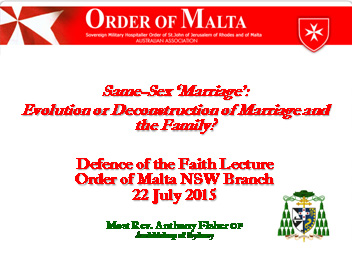
The campaign to redefine marriage has recently gained such momentum - with now three and soon four bills before the Commonwealth Parliament - that many think it is inevitable; this can leave those with misgivings feeling that they are already losers in a done deal. Some think it's the inexorable progress of liberty and equality - which leaves the doubters 'on the wrong side of history'. In this context supporters of classical marriage are presumed to have no real arguments to offer. So tonight I want to offer some reasons - not decrees from on high or from the past, not expressions of hatred or prejudice - but reasons I hope anyone can understand. I also hope you find these reasons persuasive and helpful in proclaiming and witnessing to true marriage among your families, friends and colleagues. But even if you disagree with me on this matter, I hope tonight's talk will help you understand why Australian law has always held, and many people still hold, that marriage is for people of opposite sex.
I will examine five common slogans in this debate - that it's all about justice, that sexual differences don't matter, that it's all about love, that it's all about the numbers and that it doesn't affect me. Along the way I will be offering some reasons for preserving the classical understanding of marriage rather than redefining it to include same-sex 'marriage' (SSM)[1].
- "It's all about justice!"
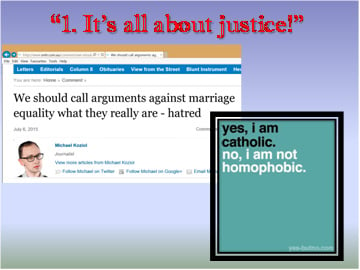
Recently, Sydney Morning Herald journalist Michael Kozoi wrote that all opposition to SSM stems from hatred, pure and simple.[2]But if that were true, then all the recent high-profile converts to SSM were previously homophobes or liars, including Barack Obama, Hillary Clinton, Penny Wong and others. If they weren't in fact bigots when they previously thought and said marriage was for a man and woman, then it shouldn't be presumed that those who now hold that view are bigots either.
In reality, of course, we all know and love someone with same-sex attraction. We recognize that people of the same sex can love each other, sometimes deeply; that they express this in ways that seem similar to the ways married men and women express their love; and that some people want to commit to this in a public ceremony. They are usually good-willed people, who feel they are missing out on something precious. Because we want the best for them, we feel the tug of the view that everything that makes opposite-sex couples happy should be open to them too. We want no more of the discriminatory or violent treatment that such people often suffered in the past and sometimes still suffer.
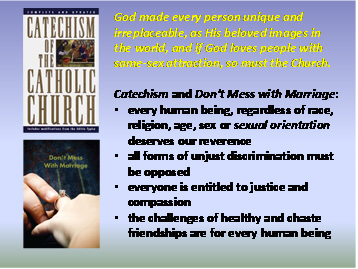
After all, God made every person unique and irreplaceable, as His beloved images in this world, and if God loves people with same-sex attraction, so must the Church. The Catechism of the Catholic Church and the recent bishops' pastoral letter, Don't Mess with Marriage, teach that every human being, regardless of race, religion, age, sex or sexual orientation deserves our reverence; that all forms of unjust discrimination must be opposed; that everyone is entitled to justice and compassion; and that the challenges of healthy and chaste friendships are for every human being, whatever their attractions.[3] If Christians haven't always talked that way or walked their talk, we should repent and do better in future.
But when it comes to what the law is or should be, not all differential treatment is necessarily unjust. Women's hospitals are closed to men; programmes for Indigenous Australians are targeted to them; primary schools enrol only children. These different treatments aren't discriminatory because the differences upon which they are based are reasonable ones. Women, children and Aborigines merit particular assistance. So if our marriage laws recognize and support man-and-woman relationships for good reasons the preservation of those laws will not necessarily be unjust to other kinds of relationship. Under any marriage law some relationships won't be recognized as 'marriage' - siblings, mere cohabiters, "throuples" etc. - but unless we know what marriage is, we can't judge whether this restriction treats all citizens justly. To put it another way: we all support marriage equality - treating all real marriages equally - the question is: what is a real marriage?
- "Sexual differences don't matter!"
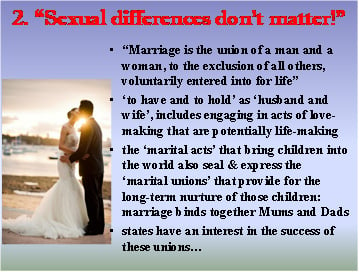
Until recently the answer to the question what is marriage was obvious: every serious culture, religion, philosophy and legal system in the world understood marriage as "the union of a man and a woman, to the exclusion of all others, voluntarily entered into for life". So it is that a man and a woman undertake not merely to live together but 'to have and to hold' as 'husband and wife', i.e. to do what husbands and wives do, including engaging in acts of love-making that are potentially life-making.
But if marriage is a natural institution that pre-exists Church and state why should governments get involved at all? For one reason only: because the 'marital acts' that bring children into the world also seal and express the 'marital unions' that provide for the long-term nurture of those children. Marriage binds those whose love-making was life-making both to each other as husband and wife and to those children as mother and father. The benefits to children of having the contributions of both a Mum and a Dad, committed to each other and to them over the long haul, are well-established in human experience and social science research.[4] In that sense, marriage is the best Department of Population, Health, Education, Welfare and Crime Prevention we've ever come up with! Other friendships may do other good things and be worthy of support; but only marriage unites a man and a woman and directs their complementary sexual-reproductive natures to the having and rearing of children. And that is why, uniquely of all human relationships, states have an interest in their success.
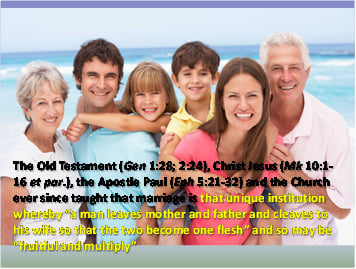
The Catholic Church, following the clear teaching of the Old Testament, of Christ Jesus and of the Apostle Paul, has always taught that marriage is that unique institution whereby "a man leaves mother and father and cleaves to his wife so that the two become one flesh"[5] and so may "be fruitful and multiply".[6] Recent popes have explored the rich significance of our sexual differentiation as male and female and of marriage as a comprehensive bodily, emotional and spiritual union - one that brings and holds together people and values that otherwise have a tendency to fall apart: men and women, sex and love, love-making and life-making, babies and parents. St John Paul II, for instance, elaborated a contemporary "theology of the body" in which the long tradition about sex being for marriage and marriage being for man and wife was shown to be rich in argument and profound in implications.[7]
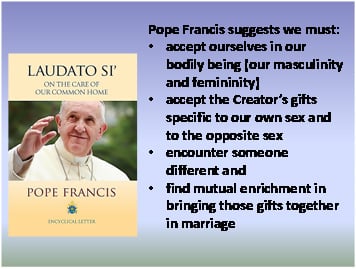
In his recent, much-praised encyclical on caring for the environment, Laudato Si, Pope Francis also suggests we must accept ourselves in our bodily being, our masculinity and femininity, accept the Creator's gifts specific to our own sex and to the opposite sex, encounter someone different and find mutual enrichment in bringing those gifts together in marriage.[8] The difference and complementarity of man and woman is the anthropological reality "at the foundation of marriage and the family"; marriage should not, this Pope suggests, be the subject of endless manipulation according to passing ideological fads.[9]
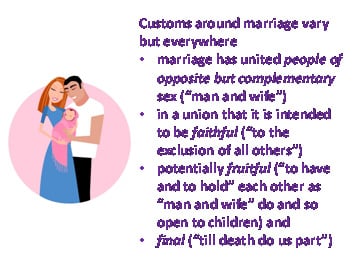
Of course, this ancient wisdom that marriage is inherently opposite-sex is not peculiar to Catholics: Christians share it with Jews and Muslims; the three great Abrahamic religions share it with the other world religions of the ancient world and since; the world religions share it with more local ones, for example, Australian Aboriginal and Pacific Islander religions; and religious traditions share it with most secular philosophies, legal systems and cultures.[10] Though customs around marriage vary between cultures and over time, there is remarkable consistency about these four dimensions of marriage: that it unites people of opposite (but complementary) sex; that this union is intended to be faithful ("to the exclusion of all others"); that this union is potentially fruitful("to have and to hold" each other as "man and wife" do and so open to children); and that this union is final ("till death do us part"). In almost every case a fifth dimension has been that this union is regarded as sacred.
- "It's all about love"
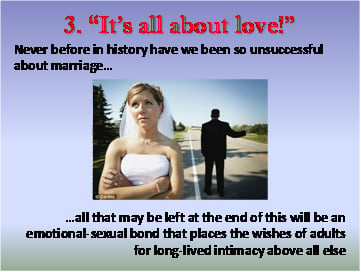
Over the last few decades there have been some very real advances in appreciation of romance and intimacy in marriage, in respect for the dignity of women and children, in the sharing of lives and responsibilities between spouses and in the theology and pastoral care of marriages. Yet even as our understanding of relationships has been enriched in these ways, modernity has found itself in a mess about marriage. In just a few decades we've moved from a situation where almost everyone in the West got married and stayed married to one where most people of marriageable age are not married: they live singly or in a series of more temporary relationships. Eventually one of these relationships may settle into being a sort of 'de facto' marriage. At some point, perhaps when a couple are thinking of having children, they may decide to solemnize it. But after years of try-before-you-buy and habitual non-commitment, many find they cannot sustain actual marriages once entered. Some try again - and fail again. Many eschew child-bearing altogether; some want children but in limited numbers, later in life, after achieving other goals. Many children now grow up without ever experiencing the love and care of a mother and father committed to each other and to them over the long haul; that makes them in turn less likely to aspire to and achieve stable marriage themselves. We all know and love people who have suffered from family breakdown; every serious social scientist and thoughtful economist understands the costs of this. Theories abound about the whys and wherefores of all this, but the what is undeniable: never before in history have we been so unsuccessful at marrying.
If we are not as good at entertaining and sustaining marriages as we were in the past, it is surely significantly because we are at least ambivalent about the defining dimensions of marriage as faithful, fruitful and final. So too the notion of marriage as a sacredact has been abandoned by many. And now another dimension, the sexual complementarity of marriage - the very thing which points beyond the union itself towards family life - is also being questioned. All that may be left at the end of this half-century-long unpicking of marriage will be an emotional-sexual bond that places the wishes of adults for long-lived intimacy above all else.
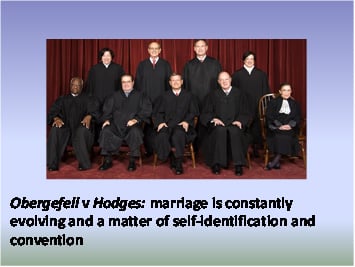
Some will say: no problem. Marriage in their eyes is merely a very flexible label for an institution with no intrinsic meaning; like Humpty Dumpty they think a word like 'marriage' means precisely whatever they want it to mean. Five of the nine judges in the recent U.S. Supreme Court case said as much: marriage is constantly evolving and really a matter of self-identification and social convention.
Reflecting such a 'marriage is what you make it' approach, there have been many experiments in recent years. In 2004 the French President approved Christelle Demichel's 'wedding' to her deceased boyfriend, a policeman killed two years before by a drunk driver.[11] About ten posthumous marriages are now registered each year in France.[12] In the same year a former soldier, Erika La Tour, fell in love with the Eiffel Tower and, after a 'wedding' ceremony, took Eiffel as her surname.[13] The French experiments continue: in 2013 the mayor of Saint-Jean-de-Fos conducted the 'wedding' of a woman to a mediaeval bridge - the menacingly-named Pont du Diable in Céret.[14] Before you make comments about the French, the 'bride', Jodi Rose, was an Australian!
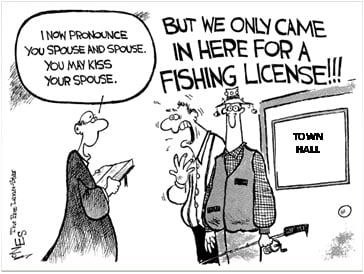
It goes without saying that some of these people should be seeing a doctor rather than a wedding celebrant and that there is much more to a marriage than a wedding ceremony. Clearly, lines can be drawn between marrying persons and marrying objects. But the hyper-emotionalised approach to marriage finds some of these developments hard to resist. In the U.S., for instance, there is now a campaign for legalized polyamory. The National Geographic channel recently ran a sympathetic series on polygamy in America, Cambridge University Press in the U.S. published a book In Defense of Plural Marriage and only yesterday the New York Times ran a sympathetic op-ed piece entitled "Is Polygamy Next?"[27] The 'throuple' is fashionable at present: three people purporting to marry each other at once. In 2013 a lesbian threesome made international headlines: two had already married each other under the Massachusetts SSM law but now a third joined their union, solemnized by a minister of religion and regularised by a complex civil arrangement; with the help of artificial insemination their baby will have three mothers but no known father.[28] Earlier this year a Thai 'gay' threesome made similar headlines after being married by a Buddhist priest: "Love is love, after all," they said.[29] Most recently a bi-sexual severally-married Los Angeles throuple made headlines as they told of their bedroom antics and resulting children.[30]
My point in raising these aberrations in contemporary conjugality is not to equate them with SSM: not at all. It is, rather, to point out that what most SSM advocates and most SSM opponents have in common is a view that these are not marriages. "All you need is love" really isn't enough. And if we agree on that, then we agree that we need some concept of what marriage is, what its ends, limits and scope are.[31]
- "It's all about the numbers!"
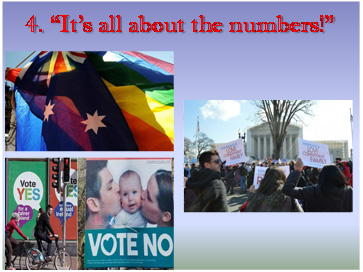
The intensification of the campaign to redefine marriage to include SSMs has been due to a number of factors, including:
- populist ones: opinion polls suggesting between 60% and 72% of Australians favour change[32]
- party political ones: the wedge politics within the major political parties has been as important as that between them
- commercial ones: the decision by major corporates to throw big bucks at the campaign, as happened in Ireland[33]
- cultural ones: 'Anglos' and a few Latin nations seem especially interested in SSM
- international ones: in particular, developments in Ireland and the U.S.
It has been argued by SSM advocates that 'conservative Catholic' Ireland's overwhelming vote in favour of SSM proves the tide of history has decisively turned and everyone should now get on board. But hold on… First, it is hard to recall when progressives last asserted that we should follow Ireland's legislative lead: would they also favour its rather restrictive abortion and divorce regimes? Would we normally follow the polling result of a country whose total population is smaller than Sydney's? Secondly, how 'conservative' and 'Catholic' Ireland really is today is a complex matter, as that country has experienced rapid secularization following entry into the E.U. and the clergy abuse crisis; the factors favouring social change in Ireland may make the "if it can happen in Ireland, it will happen everywhere" line dubious. Thirdly, just how overwhelming was support for this measure in Ireland? While it's true that 62% of those who voted, voted in favour, what is rarely mentioned is that only 60% of voters turned out for the poll: whatever those low polling numbers indicate, barely more than a third - only 36% - of eligible voters actually voted for legalising SSM in that country.[34] Fourthly, if even 100% of voters thought that only Catholics can marry or that Irish people can marry their whiskey bottles that surely wouldn't settle the matter: we would still have to ask what is marriage?
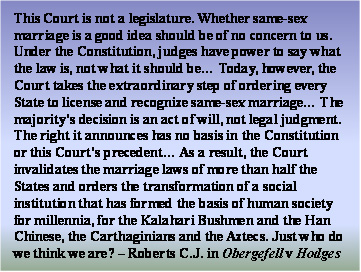
The U.S. Supreme Court decision in Oberg/efell v Hodges, which found a right to SSM hidden in the U.S. Constitution's due process and equal protection clauses, is also said to be a pointer for us.[35] Again I wonder… First, because instead of citizens or MPs making this law, an unelected elite of nine judges did so; that's not the way Australians, at least, like to decide such important matters.[36] Indeed, the most recent polls suggest more Americans now oppose the court's decision than support it and that support for SSM has declined as a result of the Supreme Court's flouting of democracy.[37] As Chief Justice Roberts put it:
This Court is not a legislature. Whether same-sex marriage is a good idea should be of no concern to us. Under the Constitution, judges have power to say what the law is, not what it should be… Today, however, the Court takes the extraordinary step of ordering every State to license and recognize same-sex marriage… The majority's decision is an act of will, not legal judgment. The right it announces has no basis in the Constitution or this Court's precedent… As a result, the Court invalidates the marriage laws of more than half the States and orders the transformation of a social institution that has formed the basis of human society for millennia, for the Kalahari Bushmen and the Han Chinese, the Carthaginians and the Aztecs. Just who do we think we are?[38]
What's more, only the barest majority - five out of the nine judges - favoured overturning the definition of marriage in most American states. Of course, the Supreme Court majority might be more enlightened than the citizens and legislators of those states, but it has not always been so: that same court long defended slavery, minimal worker protection and racial segregation, and still supports the death penalty, negligible gun control and abortion on demand, even when a majority of citizens have inclined to a more enlightened view. The legal arguments in the majority judgment are in fact so weak that it embarrasses some SSM advocates.[39] We might also ask why the few countries favouring SSM, rather than the vast majority of nations not tilting in that direction, get all the airtime.
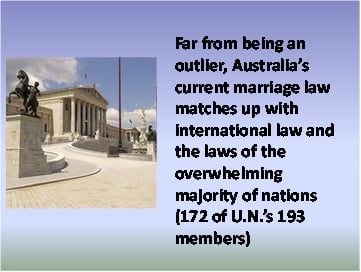
Senator Eric Abetz recently observed that the Austrian legislature's overwhelming vote against SSM (110 MPs to 26) went more or less unreported in Australia, while prominence was given to the yes vote on Pitcairn Island, a country with a population of 48![40]Far from being some sort of outlier, Australia's current marriage law reflects international law and the laws of the overwhelming majority of nations (172 of U.N.'s 193 members).[41]
- "It doesn't affect me!"
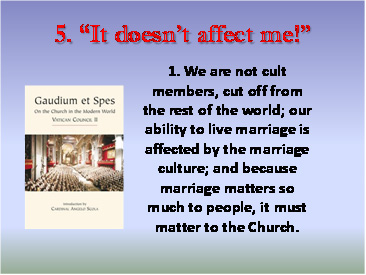
Some people would say: this doesn't really affect me. Governments can decide who is married civilly and Churches who is married religiously. Just as secular marriage doesn't endanger religious marriage, so SSM won't undermine opposite-sex marriage. It's really no big deal, so why don't believers just zip it?
Well, first, because Catholics and other Christians are not members of a cult, living in some closed-bracketed community quarantined from the rest of corrupt humanity. Our ability to live marriage well is itself much affected by whether there is a healthy marriage culture around us. As marriage has been unpicked in various ways over the past few decades, Catholics and other believers have not been immune to the effects.
What's more, our vocation is to be in and for the world, like leaven helping it rise up to God. As the Second Vatican Council famously said, "The joys and hopes, griefs and anxieties of the people of this age are joys, hopes, griefs and anxieties of the followers of Christ."[42] Because such things as marriage matter so much to ordinary people, they must matter to the Church. At a time when so many people are so confused about marriage, when many are afraid or uninspired to marry at all, or find sustaining a marriage difficult, or grow up without ever knowing a stable marriage-based family, this would be the worst time for Christians to silent about marriage. With humility and compassion, never hatred or holier-than-thou-ness, we must propose true marriage not just for our sake but for everyone's.
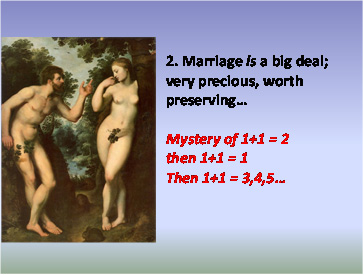
My next reason for thinking we should stay involved in this debate is that, for all the 'no big deal' talk marriage is in fact 'a big deal', something very precious and worth preserving. When men and women get together in this particular way, even people with not much faith, they almost always surround it with ceremony because they know something-bigger-than-ordinary-life is going on here and want Someone-bigger-than-ordinary-people to bless it. They understand that there is a mystery at stake that is deeper and hopefully more enduring than passing emotions and fading passions. By a strange natural and supernatural mathematics theone plus one that makes two in an ordinary couple makes one in a married couple: for individually men and women are sexually and reproductively incomplete; only by uniting 'as one flesh' do they become complete in this respect. That one-flesh unionconsummates their promises and brings children into the world. Of course some marriages are infertile; most marital acts are so. Everyone's always known this too, but the point was that for every marriage that does bring a child into the world, that child has a Mum and a Dad. So one plus one equals two for a courting couple, but by vows and one-flesh union then makes one; then as a result of that one-flesh 'marital' union uniquely suited for life-making, their one plus one may makes three and maybe four and more…
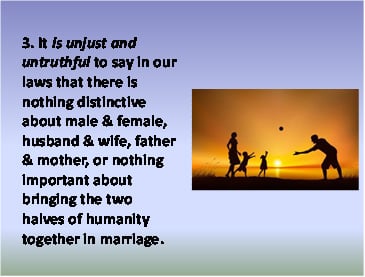
Thirdly, I have argued that knowing what real marriage is we will understand why it is not arbitrary or discriminatory to regulate and support it in various ways. What is unjust and untruthful is to say in our laws that there is nothing distinctive about male and female, husband and wife, father and mother, or nothing important about bringing the two halves of humanity together in marriage. It is unjust to children to say having a Mum and a Dad shouldn't matter. It is discriminatory towards those already married or who would like in future truly to marry to redefine marriage in a way that reduces it to emotions and sex.
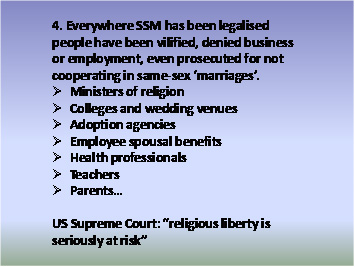
Advocates of SSM claim that those who favour opposite-sex marriage will be unaffected by this change and that any legislation will include religious 'exemptions'. Yet that already frames religious liberty as toleration by an enlightened majority of an eccentric minority. What's more, some Greens MPs have opposed any such provisions for religious bodies or openly admitted that any exemptions will be temporary, just to get SSM laws across the line.[43] Everywhere SSM has been legalised people have been vilified, denied business or employment, even prosecuted for not cooperating in SSMs. Ministers of religion may be protected, but that's a tiny proportion of believers. Christian colleges and wedding venues have been obliged to accommodate same-sex couples. Catholic adoption agencies have been forced to place children with same-sex couples or close. Christian employers have been required to extend spousal benefits to 'same-sex spouses'. Health professionals have been punished for denying AI or IVF to 'same-sex spouses'. Teachers have been required to teach and parents forced to put their children in classes that promote SSM and homosexual activity.[44] Further examples of harassment and discrimination in the name of this latest political correctness abound.[45] Several of the judges in the recent US Supreme Court case admitted religious liberty was seriously at risk.[46]
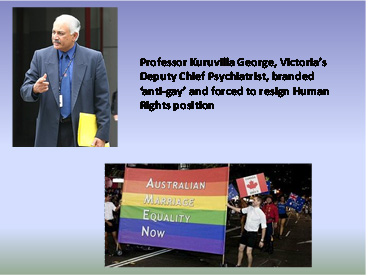
Lest we imagine that the Australian SSM movement would be uniquely tolerant of those with a different view, consider the case of the Deputy Chief Psychiatrist of Victoria who in 2012 was forced to resign his position on that state's Human Rights and Equal Opportunity Commission. His crime: he had told a Senate Inquiry that children do better on average with a Mum and Dad rather than being in a single or same-sex parent family.[47] People hosting or speaking at an Australian Christian Lobby conference on marriage last year were subjected to such intimidation and vilification - including being labelled as Ku Klux Klan and neo-Nazis - that some speakers stayed away.[48] Recently the SSM lobby in Tasmania has threatened the Catholic Archbishop with an anti-discrimination suit merely for distributing the bishops' pastoral letter on the subject.[49] Without doubt the legalisation of SSM would seriously threaten religious liberty in this country.[50]
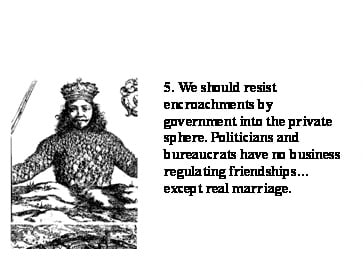
Fifthly, I think we should resist encroachments by government into the private sphere. We don't want politicians or bureaucrats telling us who we should love or how or for how long or who we should have sex with. The only friendship governments and bureaucrats properly get involved in is opposite-sex marriage because it is the nursery of the next generation and so dramatically affects the community's future.
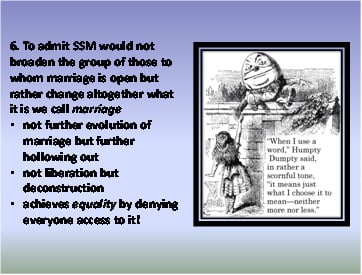
Finally, most advocates of SSM say they simply want what others have got - stripped of unnecessary elements such as sexual-reproductive complementarity and orientation to children, and then re-mythologized as romance aspiring to longevity, celebrated with public ceremonial and given legal recognition. But tonight I have argued that to admit SSM would not be to broaden the group of those to whom marriage is open but rather to change altogether what it is we call marriage; that this is not the further evolution of marriage but its further hollowing out, not liberation of that institution from the confines of religion and prejudice so much as deconstruction of that institution. Ironically, in trying to widen the pool of those who have access to it civilly, we actually deny everyone a chance at the real thing.
Conclusion: be not afraid

The push to redefine marriage in Australia is not the done deal some think it is and those who resist it are not all bigots without reasons to offer as some suggest. Too much of the supposed 'debate' over the issue so far in Australia has been slogans, emotional spin and almost unprecedented public bullying of opponents. The real debate has hardly begun and we should resist been railroaded into this social change too quickly. That said, I must confess some admiration of the highly motivated and well organised minority[51] who have so effectively used the media, corporations and law to press this change on the general public. I only wish that the 'silent majority' of Australians, who enjoy the benefits of real marriage, would stand up for that institution with a similar passion and effectiveness.
Some think the way to sure up all friendships is to treat them as marriages. Perhaps this is because modernity has forgotten how to love. That sounds odd in a culture saturated with love songs and talk of 'making love'. Yet the most common "How to?" and "What is?" questions asked of the Google search engines are "How to love?" and "What is love?"[52] Modernity struggles with any kind of love that goes beyond feelings and intimacy: the cross-shaped, self-giving, Easter Day sort of loving rather than the heart-shaped, self-pleasing, Valentine's Day sort of loving. I believe that the SSM debate highlights the crucial importance of recovering healthy non-marital friendships - self-giving, other-directed, generous and chaste. We must learn again the arts of loving. These habits of heart that are no monopoly of the married, but the truly married are models for the rest of us of persevering in loving despite radical differences, of commitment and self-sacrifice for the sake not just of personal or even mutual goals but of yet-to-be-met children and a yet-unknown future society.
Marriage is a precious patrimony of humanity, just too important to be treated as anyone's plaything. The further deconstruction of marriage is not inevitable - nothing is, except death and taxes - nor is it desirable. So do not be afraid to spread the good news about marriage and family. Speak the truth, always in love. God bless your efforts in supporting this great cause.
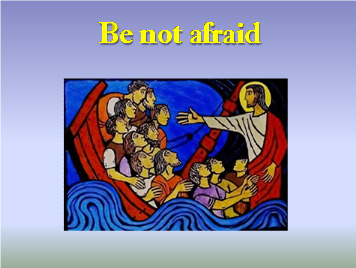
[1] I distinguish 'same-sex marriage' (SSM) from the 'opposite-sex marriage' but with inverted commas implied around the word 'marriage', since whether SSM is truly marriage is precisely what is at issue.
[2] Michael Kozoi, 'We should call arguments against marriage equality what they really are - hatred,' Sydney Morning Herald6 July 2015: www.smh.com.au/comment/we-should-call-arguments-against-marriage-equality-what-they-really-are-hatred-20150706-gi5ybd.html
[3] Catechism of the Catholic Church §2358; Australian Catholic Bishops Conference, Don't Mess with Marriage: Pastoral Letter on the 'Same-sex Marriage' Debate (2015).
[4] See e.g. P Amato, 'The impact of family formation change on the cognitive, social, and emotional well-being of the next generation,' The Future of Children 15 (2005): 75-96; B Ellis et al., 'Does father absence place daughters at special risk for early sexual activity and teenage pregnancy?' Child Development 74 (2003): 801-21; T Finn, 'Social science and same-sex parenting,'National Catholic Bioethics Quarterly 13 (Autumn 2013): 437-44; C Harper and S McLanahan, 'Father absence and youth incarceration,' Journal of Research on Adolescence 14 (2004): 369-97; L Marks, 'Same-sex parenting and children's outcomes: A closer examination of the American Psychological Association's brief on lesbian and gay parenting,' Social Science Research 41 (2012): 735-51; E Marquardt, Family Structure and Children's Educational Outcomes (New York: Institute for American Values, 2005); S McLanahan and G Sandefur, Growing Up with a Single Parent: What Hurts, What Helps (Cambridge, Ma.: Harvard University Press, 1994); M Regnerus, 'How different are the adult children of parents who have same-sex relationships? Findings from the New Family Structures Study,' Social Science Research 41 (2012): 752-70; W Wilcox et al., Why Marriage Matters: Twenty-Six Conclusions from the Social Sciences (2nd ed., New York: Institute for American Values, 2005); W Wilcox, 'Reconcilable differences: What social sciences show about the complementarity of the sexes and parenting,' Touchstone 18 (Nov 2005): 36-45; M Somerville, 'Children's human rights and unlinking child-parent biological bonds with adoption, same-sex marriage and new reproductive technologies,' Journal of Family Studies 13 (2007): 179-201; K Young and P Nathanson, 'Redefining marriage or deconstructing society: A Canadian case study,' Journal of Family Studies 13 (2007): 133-178; D Sullins, 'Emotional problems among children with same-sex parents: difference by definition,' British Journal of Education, Society and Behavioural Science 7 (2015): 99-120.
[5] Gen 2:24; Mk 10:1-16; Eph 5:21-32.
[6] Cf. Gen 1:27-28. For examples from the tradition see the notes in Congregation for the Doctrine of the Faith,Considerations Regarding Proposals to Give Legal Recognition to Unions between Homosexual Persons (2003).
[7] St John Paul II, Familiaris Consortio: On the Christian Family in the Modern World (1981); Man and Woman He Created Them: A Theology of the Body (trans. M. Waldstein, Boston: Pauline Books & Media, 2006). This work build on a tradition including: B Ashley, Theologies of the Body (Braintee MA: John XXIII Medical-Moral Research & Education Center, 1985); P Brown, The Body and Society: Men, Women and Sexual Renunciation in Early Christianity (New York, Columbia UP Press, 1988); R García de Haro, Marriage and the Family in the Documents of the Magisterium: A Course in the Theology of Marriage (2nd ed, San Francisco: Ignatius Press, 1993); J Medina Estévez, Male and Female He Created Them: On Marriage and the Family (San Francisco: Ignatius, 2003); K. Wojty³a, Love and Responsibility (trans. Grzegorz Ignatik, Pauline Books and Media, 2013). Benedict XVI made some related points in: Deus Caritas Est: On Christian Love (2005), 3-9. There is an enormous literature commenting on John Paul's thought in this area, including books by D Asci, B Guevin, R Hogan, J Kippley, J LeVoir, A Percy, M Prokes, K Schmitz, W Schu, Angelo Scola, M Shivanandan, V Walsh and C West.
[8] Pope Francis, Laudato Si: On Care for Our Common Home (2015), 155.
[9] Pope Francis, Address to Participants in the International Colloquium on the Complementarity between Man and Woman Sponsored by the Congregation for the Doctrine of the Faith, 17 November 2014, 1; 'Pope reiterates view that same-sex marriage is "anthropological regression",' Zenit 3 January 2014: www.zenit.org/en/articles/pope-reiterates-view-that-same-sex-marriage-is-anthropological-regression; 'Pope Francis to Schoenstatt movement: Marriage never been attacked so much as now,' News.va27 October 2014: www.news.va/en/news/pope-francis-to-schoenstatt-movement-marriage-neve; Elise Harris, '"What is being proposed is not marriage" - Pope calls for defense of family,' CNA/EWTN News, 26 October 2014:www.catholicnewsagency.com/news/what-is-being-proposed-is-not-marriage-pope-calls-for-defense-of-family-12766/. Cf. 'Same-sex marriage: Irish vote 'defeat for humanity' says Vatican official,' BBC News 27 May 2015: www.bbc.com/news/world-europe-32900426.
[10] Cf. CDF, Considerations Regarding Proposals to Give Legal Recognition to Unions between Homosexual Persons, 2.
[11] P Broughton, 'Wedding joy for bride who wed dead groom,'http://www.telegraph.co.uk/news/worldnews/europe/france/1455148/ Wedding-joy-for-bride-who-wed-dead-groom.html.
[12] "French woman marries boyfriend one year after he died," Daily Telegraph 16 November 2009 www.telegraph.co.uk/news/worldnews/ europe/france/6581612/French-woman-marries-boyfriend-one-year-after-he-died.html.
[13] A Simpson, 'Woman with objects fetish marries Eiffel Tower,' The Telegraph 4 June 2008:www.telegraph.co.uk/news/newstopics/ howaboutthat/2074301/Woman-with-objects-fetish-marries-Eiffel-Tower.html.
[14] www.dailymail.co.uk/news/article-2356774/Australian-woman-Jodi-Rose-marries-bridge-France-gets-mayors-blessing.html
[15] Sasjkia Otto 'Woman to marry fairground ride,' Telegraph 5 August 2009 http://www.telegraph.co.uk/news/newstopics/ howaboutthat/5972632/Woman-getting-married-to-fairground-ride.html.
[16] E Pfeiffer, 'Seattle woman "marries" building to protest its demolition,' The Sideshow 30 January 2012:http://news.yahoo.com/blogs/ sideshow/seattle-woman-marries-building-protest-demolition-224250710.html.
[17] T Jivanda, 'Florida Woman marries giant ferris wheel called Bruce,' The Independent 18 November 2013:www.independent.co.uk/ news/world/america s/florida-woman-marries-giant-ferris-wheel-called-bruce-8947143.html.
[18] She is interviewed at: www.youtube.com/watch?feature=player_embedded&v=mY64l69DNQA.
[19] 'Woman marries HERSELF in emotional wedding ceremony after failing to meet "the one" before the age of 40,' Daily Mail Australia 28 January 2015: www.dailymail.co.uk/femail/article-2928352/Woman-marries-emotional-wedding-ceremony-failing-meet-one-age-40.html.
[20] Re Grace Gelder: C Huang, 'London woman marries herself after being single for six years,' Aol.com 6 October 2014:www.aol.com/ article/2014/10/06/london-woman-marries-herself-after-being-single-for-six-years/20973249/; re Jennifer Hoes: Craig Johnson, 'Is self-marriage for you?' HLN 17 October 2012: http://www.hlntv.com/article/2012/05/31/self-marriage-woman-marries-herself-would-you; re Liu Ye: 'Chinese man married himself,' Culture Town 10 March 2013:http://culturetown.org/chinese-man-married-himself/; re Chen Wei Yih: 'Taiwanese woman to marry herself,' Telegraph 22 October 2010 www.telegraph.co.uk/news/ worldnews/asia/taiwan/8080685/Taiwanese-woman-to-marry-herself.html; re Sam,my Power: S Fuda, 'Ex Sydney radio host Sammy Power has married herself - yes herself - in a bizarre ceremony to celebrate life,'Daily Telegraph 8 July 2014: www.dailytelegraph.com.au/entertainment/sydney-confidential/ex-sydney-radio-host-sammy-power-has-married-herself-yes-herself-in-a-bizarre-ceremony-to-celebrate-life/story-fni0cvc9-1226980818126.
[21] Chadil Deffy of Thailand 'married' his deceased girlfriend Sarinya Kamsook: Nick Enoch, 'Died and groom: Grief-stricken bridegroom marries DEAD girlfriend in grim Thai ceremony,' Daily Mail 18 January 2012: http://www.dailymail.co.uk/news/article-2087909/Grief-stricken-bridegroom-Chadil-Deffy-marries-DEAD-girlfriend-grim-Thai-ceremony.html#ixzz3faqC6BKO.
[22] Eija-Riitta Berliner-Mauer 'married' the Berlin wall: Richard Alleyne, 'Woman married to Berlin Wall for 29 years,'Telegraph 27 May 2008: www.telegraph.co.uk/news/newstopics/howaboutthat/2035996/Woman-married-to-Berlin-Wall-for-29-years.html; Davecat 'married' a blow-up doll: 'Davecat tells how he married a RealDoll named Sidore Kuroneko Davecat tells how he married a RealDoll named Sidore Kuroneko,' News.com.au 4 October 2013:http://www.news.com.au/lifestyle/relationships/davecat-tells-how-he-married-a-realdoll-named-sidore-kuroneko/story-fnet09p2-1226729924053; Maria Griffin 'married' a Ford truck: Kim Fusaro, 'Girl marries truck,' Glamor Weddings 13 April 2011:www.glamour.com/weddings/blogs/save-the-date/2011/04/breaking-news-girl-marries-tru. See:www.spiegel.de/international/spiegel/objectophilia-fetishism-and-neo-sexuality-falling-in-love-with-things-a-482192.html.
[23] K Lah, 'Tokyo man marries video game character,' CNN International Edition 17 December 2009:http://edition.cnn.com/2009/WORLD/ asiapcf/12/16/ japan.virtual.wedding/.
[24] Uwe Mitzscherlich 'married' his cat: 'German man marries his dying cat,' BBC News 3 M2010:http://news.bbc.co.uk/2/hi/8658327.stm; Barbarella Burchner 'married' two cats: R Styles, 'Woman celebrating decade of marriage to two pet cats,' Daily Mail Australia 6 January 2015: www.dailymail.co.uk/femail/article-2898715/Woman-celebrating-decade-marriage-two-pet-CATS-says-never-happier-no-plans-human-husband.html ; Sharon Tendler 'married' a dolphin: 'Woman weds dolphin,' The Age 30 December 2005: www.theage.com.au/news/world/woman-weds-dolphin/2005/12/30/1135732715098.html; Charles Tombe 'married' a goat: '"Man marries goat" captivates million,' Telegraph 3 May 2007: www.telegraph.co.uk/news/worldnews/1550479/Man-marries-goat-captivates-millions.html; Ngurah Alit 'married' a cow: 'Bali teen marries cow that seduced him,' www.whatsonxiamen.com/ news12770.html; Bimbala Das 'married' a snake:http://timesofindia.indiatimes.com/india/Orissa-woman-marries-snake/ articleshow/1609295.cms.
[25] Joseph Guiso 'married' a dog: 'Puppy love: man marries dog,' Toowoomba Chronicle 1 December 2010www.thechronicle.com.au/news/ man-marrys-dog-city-first-toowoomba/710538.
[26] 'South Korean Lee Jin-gyu "marries" pillow lover Fate Testarossa,' Daily Telegraph 16 March 2010:www.dailytelegraph.com.au/ lifestyle/south-korean-lee-jin-gyu-marries-pillow-lover-fate-testarossa/story-e6frf00i-1225841359729;
[27] http://channel.nationalgeographic.com/channel/polygamy-usa/; Ronald Otter, In Defense of Plural Marriage (Cambridge University Press, 2015); W Baude, 'Is polygamy next?' New York Times 21 July 2015:http://mobile.nytimes.com/2015/07/21/opinion/is-polygamy-next.html?referrer=&_r=1. See also: M Cook, 'Polygamy comes out of the closet,' MercatorNet 17 December 2013: www.mercatornet.com/conjugality/view/13280; S Burrows, 'Polyamory is next, and I'm one reason why,' The Federalist 30 June 20145: http://thefederalist.com/2015/06/30/polyamory-is-next-and-im-one-reason-why/; F Deboer, 'It's time to legalize polygamy,' PoliticoMagazine, 26 June 2015: www.politico.com/ magazine/story/2015/06/gay-marriage-decision-polygamy-119469.html#.VZYCr_mqqko.
[28] D Li, 'Married lesbian "throuple" expecting first child,' New York Post 23 April 2014:http://nypost.com/2014/04/23/married-lesbian-threesome-expecting-first-child/
[29] F Haque, 'Meet the world's first gay married throuple,' by New York Post 27 February 2015: http://nypost.com/2015/02/27/ thai-throuple-believed-to-be-worlds-first-gay-married-trio/; Carolyn Moynihan, 'The advance of the "throuple",' MercatorNet 9 March 2015: www.mercatornet.com/conjugality/view/15750.
[30] 'How this Brit wooed two gorgeous women into his throuple,' Daily News 13 April 2015:www.nydailynews.com/news/world/brit-wooed-2-gorgeous-women-throuple-article-1.2183501.
[31] As Pope Francis has observed, if marriage is viewed simply as a commitment to give and receive emotional satisfaction, then it can be reconstructed at will; but call it what you like, the new invention will not really be marriage: Evangelii Gaudium: Apostolic Exhortation on the Proclamation of the Gospel in Today's World (2013) 66http://w2.vatican.va/content/francesco/en/apost_exhortations/documents/ papa-francesco_esortazione-ap_20131124_evangelii-gaudium.html.
[32] E.g. Lisa Cox, 'Poll shows growing support for same-sex marriage,' Sydney Morning Herald 15 July 2015:www.smh.com.au/federal-politics/political-news/poll-shows-growing-support-for-samesex-marriage-20140714-3bxaj.html.
[33] Conservative estimates put one American activist lobby's investment in the Irish plebiscite alone at $A150m.
[34] www.referendum.ie/; M Cook, 'What lies ahead for marriage in Ireland?' MercatorNet 25 May 2015:www.mercatornet.com/ conjugality/view/what-lies-ahead-for-marriage-in-ireland/16212.
[35] Obergefell v Hodges 576 US xxx (2015). Critiques include: 'After Obergefell: A First Things symposium,' First Things 27 June 2015: www.firstthings.com/web-exclusives/2015/06/after-obergefell-a-first-things-symposium; 'The Supreme Court has legalized same-sex marriage: Now what?' National Review 27 June 2015: www.nationalreview.com/article/420420/same-sex-marriage-obergefell-supreme-court; H M Alvaré, 'A decision that's unfair and disenfranchising,' Crux 25 June 2015:www.cruxnow.com/life/2015/06/25/ supreme-court-gay-marriage-is-constitutional/; R T Anderson, 'Marriage and the constitution: What the court said and why it got it wrong,' Public Discourse 1 July 2015: www.thepublicdiscourse.com/2015/07/15247; M J Franck, 'Thanks for everything, Justice Kennedy,' Public Discourse 29 June 2015: www.thepublicdiscourse.com/2015/06/15235/; S Girgis, 'After Obergefell: The effects on law, culture, and religion,' Crisis Magazine 20 July 2015:www.crisismagazine.com/2015/after-obergefell-the-effects-on-law-culture-and-religion; G Weigel, "Ruling says it all: law is an ass," Catholic Weekly 1 July 2015: www.catholicweekly.com.au/article.php?classID= 1&subclassID= 2&articleID=14359.
[36] J Albrechtsen, 'A social revolution left in the hands of lawyers,' The Australian 8 July 2015: http://www.theaustralian.com.au/opinion/ columnists/a-social-revolution-left-in-the-hands-of-lawyers/story-e6frg7bo-1227432812080.
[37] Dominic Bouck OP, 'More Americans oppose Obergefell v. Hodges than support it,' First Things 20 July 2015:www.firstthings.com/blogs/ firstthoughts/2015/07/more-americans-oppose-obergefell-v-hodges-than-support-it; M Gallagher, 'Another new poll: Support for gay marriage falls, religious liberty concerns skyrocket,' The Pulse 20 July 2015:http://thepulse2016.com/maggie-gallagher/2015/07/20/ another-new-poll-support-for-gay-marriage-falls-religious-liberty-concerns-skyrocket/.
[38] 576 U. S. ____ (2015) 2-3,11,23 Roberts, C. J., dissenting.
[39] E.g. C Cooke, 'A few thoughts on today's Obergefell Supreme Court decision,' National Review 26 June 2015: http://www.nationalreview. com/corner/420381/due-process-gay-marriage-gay-marriage-decision; M Perry, 'Obergefell v. Hodges: An imagined opinion, concurring in the judgment,' Social Science Research Network 27 June 2015:http://papers.ssrn.com/sol3/papers.cfm?abstract_id= 2624022.
[40] E Abetz, 'The fight for same-sex marriage in Australia is far from over,' Sydney Morning Herald 1 July 2015:www.smh.com.au/comment/ comment-eric-abetz-on-gay-marriage-20150701-gi26gi.html.
[41] The United Nations' Universal Declaration of Human Rights couches most rights in terms of "Everyone has…" or "No one shall…". However the right to marriage is couched as "Men and women… have the right to marry and found a family" (Art 16). Only with respect to that right is male-female sexual differentiation made explicit because it is predicated on the view that marriage is (only) between a man and a woman. As of 3 July 2015 Wikipedia listed 22 countries in which SSM is or will be performed legally: Argentina, Belgium, Brazil, Canada, Denmark, Finland, France, Iceland, Ireland, Luxembourg, Mexico (states thereof only) Netherlands, New Zealand, Norway, Portugal, Slovenia, South Africa, Spain, Sweden, United Kingdom, United States and Uruguay. See also 'At a glance: same-sex marriage around the world,' SBS News, 7 October 2014 (updated 29 June 2015):www.sbs.com.au/news/article/2014/10/07/glance-same-sex-marriage-around-world: this list does not include Mexico, which is included in Wikipedia's list: hence I have counted 21 nations.
[42] Vatican Council II, Gaudium et spes: Dogmatic Constitution on the Church in the Modern World, 1:www.vatican.va/archive/ hist_councils/ii_vatican_council/documents/vat-ii_const_19651207_gaudium-et-spes_en.html.
[43] The Australian Greens declare: "For years, the Greens have said that blanket exemptions from national equality laws for religious organisations - particularly for those receiving government funds to provide a service, like schools, hospitals and shelters - is unfair and contrary to the values of a caring society": http://greens.org.au/LGBTI. The NSW Greens say "The Greens will work to… remove religious exemptions from the NSW Anti-Discrimination Act": http://nsw.greens.org.au/equality.
[44] References to these and other cases in Australian Catholic Bishops Conference, Don't Mess with Marriage: Pastoral Letter on the 'Same-sex Marriage' Debate (2015).
[45] See R Reno, "The public square: rewriting nature's law", First Things 243 (May 2014): 3-4 and K Kersten, 'Legislative bullying' in the same edition: 21-2. In 2014 the City of Coeur d'Alene, Idaho, threatened Christian ministers who refused to perform same-sex weddings with 180 days' imprisonment or fines of $1000 per day's delay: 'Christian ministers told to perform same-sex "weddings" or face jail,' National Catholic Register, 20 Oct 2014: www.ncregister.com/daily-news/christian-ministers-told-to-perform-same-sex-weddings-or-face-jail/#ixzz3GjolTjVL. In Houston City, subpoenas have been issued to pastors compelling them to adduce any sermons in which they discuss homosexuality, gender identity or the city's mayor: T Starnes, 'City of Houston demands pastors turn over sermons,' Fox News, 14 October 2014: www.foxnews.com/opinion/2014/10/14/city-houston-demands-pastors-turn-over-sermons/. In Denmark, gay couples now have the right to marry in any church they wish irrespective of the views of the priest who has charge of the church: R Orange, 'Gay Danish couples win right to marry in church,'The Telegraph, 7 Jun 2012: www.telegraph.co.uk/news/worldnews/europe/ denmark/9317447/Gay-Danish-couples-win-right-to-marry-in-church.html. In Colorado a baker was found to have contravened the state's anti-discrimination legislation by refusing to bake a cake for a same-sex "wedding" and will no longer sell wedding cakes: 'Colorado baker to stop making wedding cakes after losing discrimination case,' CBS News, 31 May 2014: www.cbsnews.com/news/ colorado-baker-to-stop-making-wedding-cakes-after-losing-discrimination-case/. In Oregon, a couple faces bankruptcy for similarly refusing to bake a same-sex "wedding" cake: C Moynihan, "Bakery owners face bankruptcy after a discrimination finding", Mercatornet, 9 Oct 2014:www.mercatornet.com/conjugality/view/14924. See also B O'Neill, 'Breathtaking conformity,' Mercatornet, 12 Apr 2013 (originally published on Spiked): www.mercatornet.com/articles/view/breathtaking_conformity.
[46] See: R T Anderson, 'Will marriage dissidents be treated as bigots or pro-lifers?' The Federalist 14 July 2015:http://thefederalist.com/2015/07/14/will-marriage-dissidents-treated-bigots-pro-lifers/; S P Bailey, 'Here are the key excerpts on religious liberty from the Supreme Court's decision on gay marriage,' Washington Post 26 June 2015:www.washingtonpost.com/news/acts-of-faith/wp/2015/06/ 26/here-are-the-key-excerpts-on-religious-liberty-from-the-supreme-courts-decision-on-gay-marriage/; M Branaugh and S Ogles, 'What churches and clergy should note from the same-sex marriage ruling,' Christianity Today 26 June 2015: www.churchlawandtax.com/blog/2015/june/what-churches-and-clergy-should-note-from-same-sex-marriage.html; M Caspino, 'Does Supreme Court's marriage decision protect religious entities?' National Catholic Register 26 June 2015: www.ncregister.com/daily-news/does-supreme-courts-marriage-decision-protect-religious-entities/; E Green, 'How will the U.S. Supreme Court's same-sex-marriage decision affect religious liberty?" Atlantic Monthly 26 June 2015:www.theatlantic.com/politics/archive/2015/06/how-will-the-us-supreme-courts-same-sex-marriage-decision-affect-religious-liberty/396986/.
[47] F Farouque, 'Anti-gay marriage professor quits equal opportunity board,' The Age 15 May 2012:http://www.theage.com.au/victoria/ antigay-marriage-professor-quits-equal-opportunity-board-20120515-1yo4i.html.
[48] T McIlroy & B Westcott, 'Hyatt Hotel defends booking for Australian Christian Lobby's anti-gay marriage conference,'Sydney Morning Herald 22 Oct 2014: http://www.smh.com.au/act-news/hyatt-hotel-defends-booking-for-australian-christian-lobbys-antigay-marriage-conference-20141021-1196rn.html.
[49] A Shanahan, "Same-sex lobby threatens Catholic archbishop over booklet," The Australian 4 July 2015: http://www.theaustralian. com.au/national-affairs/state-politics/same-sex-lobby-threatens-catholic-archbishop-over-christian-booklet/story-e6frgczx-1227427550649
[50] See D Laycock and A Picarello (eds), Same-Sex Marriage and Religious Liberty: Emerging Conflicts (Rowman & Littlefield, 2008).
[51] Persons identifying as 'LGBTI' account for less than 2% of the Australian population and only 0.7% of all Australians who identify as being in any form of 'couple relationship' are a same sex couple. The issue rates very lowly in terms of the importance Australians put on it: unprompted, only 1% of Australians identify redefining marriage as an important issue. Even GetUp's own recent survey of over 30,000 supports ranked it at the bottom of their list, with only around 2% identifying it as an issue of any importance.
Subscribe to: Posts (Atom)





No comments:
Post a Comment